#the witness for the prosecution and other stories
Quote
I had never felt more helpless. The power that defeated us was still at large, undefeated, and though quiescent for the minute we could hardly regard as doing otherwise than biding its time.
Agatha Christie, The Witness for the Prosecution and Other Stories
#trump 2024#us presidental election#class struggle#agatha christie#christie#the strange case of sir andrew carmichael#1972#christie 1972#quote#the witness for the prosecution and other stories
0 notes
Text
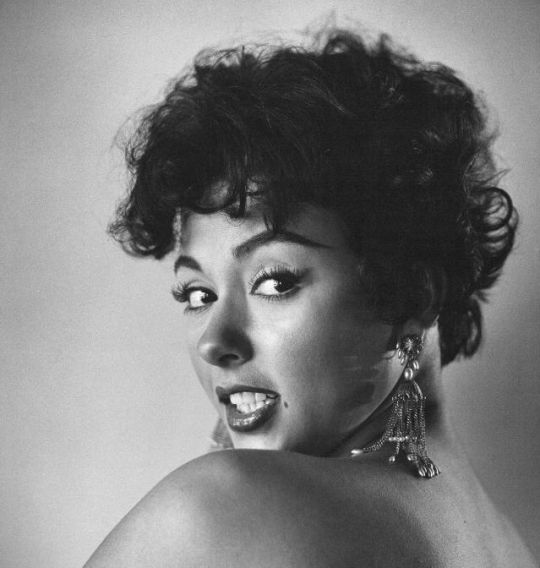
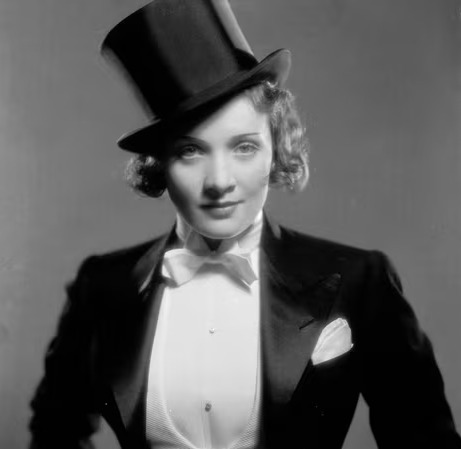
Propaganda
Rita Moreno (Singin' in the Rain, West Side Story)—She’s an EGOT, an absolute legend for how she navigated her career as a woman of color in the fifties and sixties. Her performance as Anita in West Side Story is why I go back to that movie so many times. She is an icon and she is the moment.
Marlene Dietrich (Shanghai Express, Witness for the Prosecution, Morocco)—Bisexual icon, super hot when dressed both masculine and feminine, lived up her life in the queer Berlin scene of the 1920s, central to the 'sewing circle' of the secret sapphic actresses of Old Hollywood, refused lucrative offers by the Nazis and helped Jews and others under persecution to escape Nazi Germany, the love of my life
We are in the quarterfinals of the Hot & Vintage Movie Women Tournament. All other polls in this bracket can be found here. Propaganda is not my own and is on a submission basis. Please reblog with further support of your beloved hot sexy vintage woman.
[additional propaganda submitted under the cut.]
Rita Moreno propaganda:
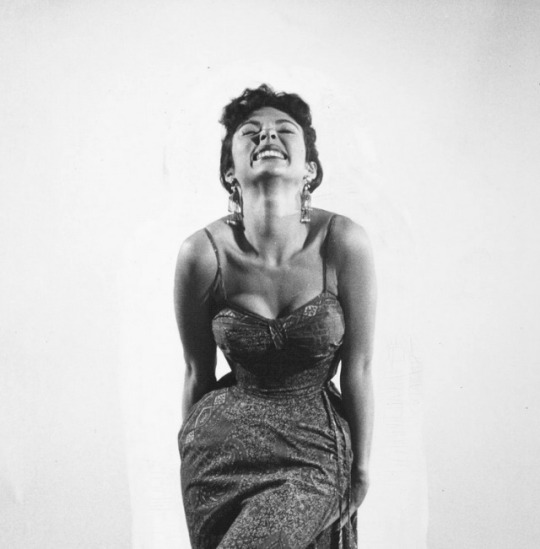
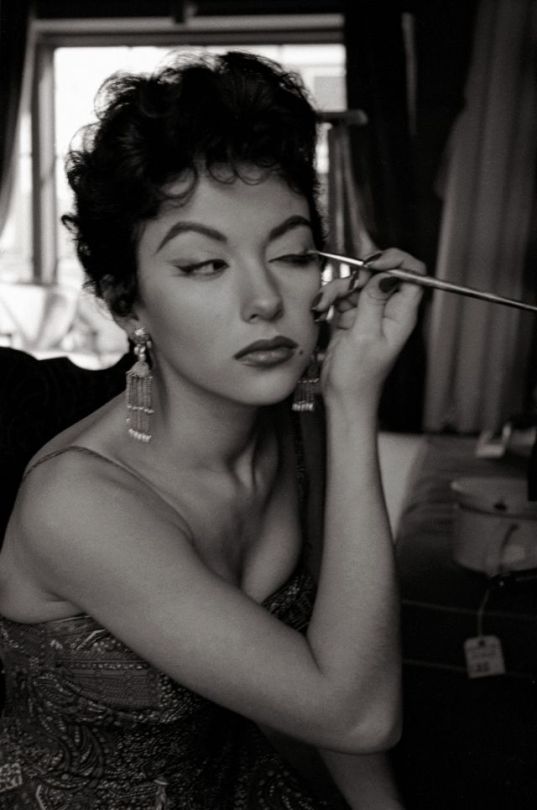
"Amazing showstopping actress in her one big memorable role as Anita in West Side Story. She sings and dances with unmatched joy and energy, and then breaks your heart with her acting. Rita took a role that felt as a stereotype to latina women and made it compelling and multifaceted. Her subsequent career was filled with mostly side roles, but she still managed to excel in whatever Hollywood threw at her."
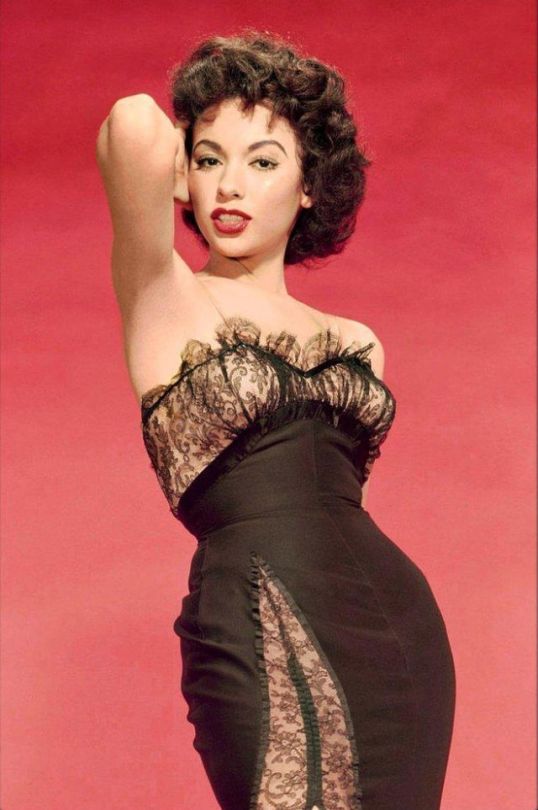
"It’s Rita!! The EGOT herself! She can act, she can sing, she can dance, a triple threat. Obviously absolutely iconic as Anita in West Side Story (her part of the Tonight Quintet is the sexiest part of the film, fight me). But before that she was the amazing Zelda in Singin’ In the Rain!?! Thanks Zelda, you’re a real pal."
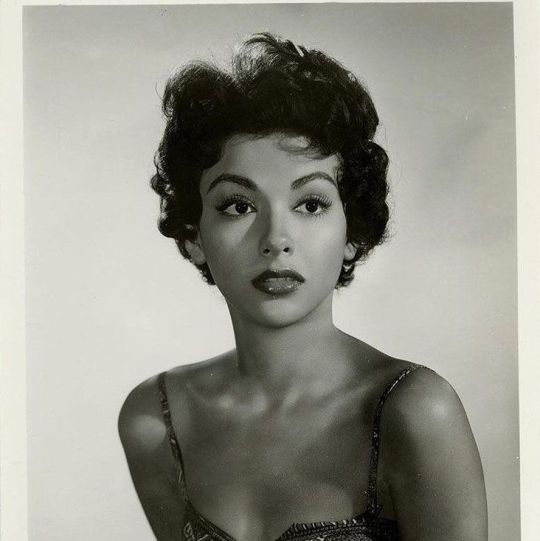
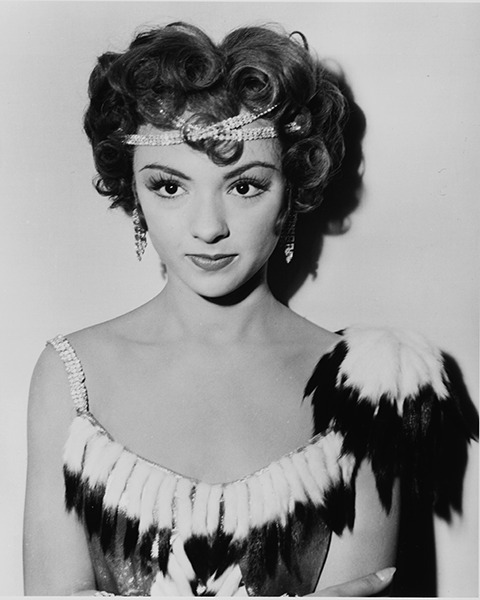
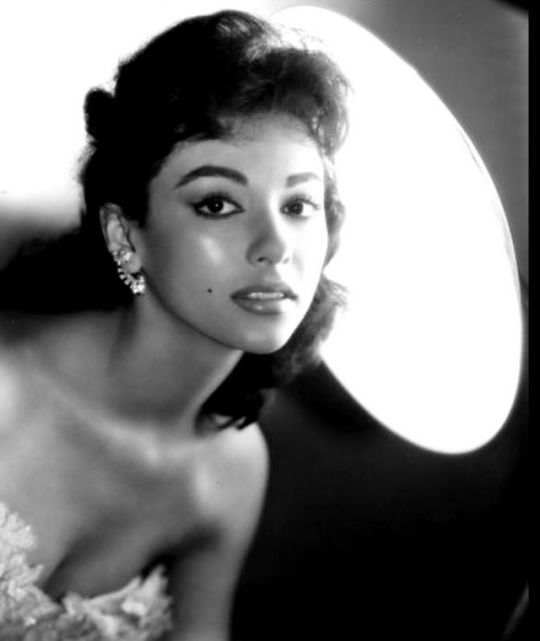
"She continues to be amazing but also she's got legs for days."
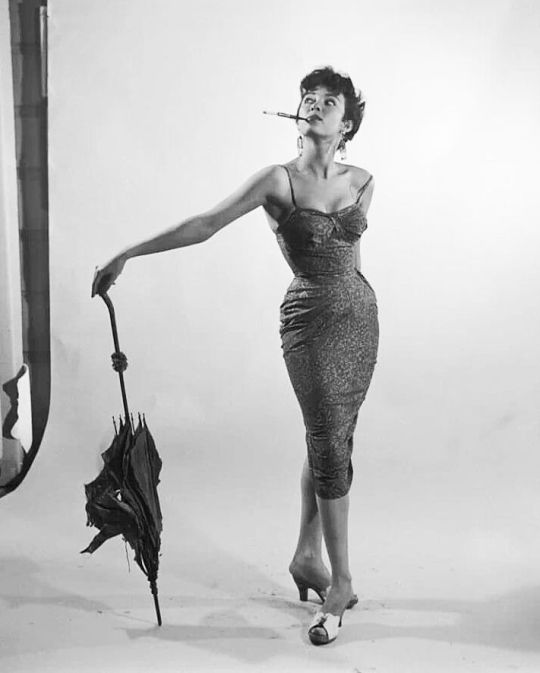
"THEE iconic rita moreno, EGOT winner, civil rights activist, theatre legend. watch her documentary "Rita Moreno: Just a Girl Who Decided to Go for It". also her rendition of "fever" on the muppet show"
youtube
Marlene Dietrich:
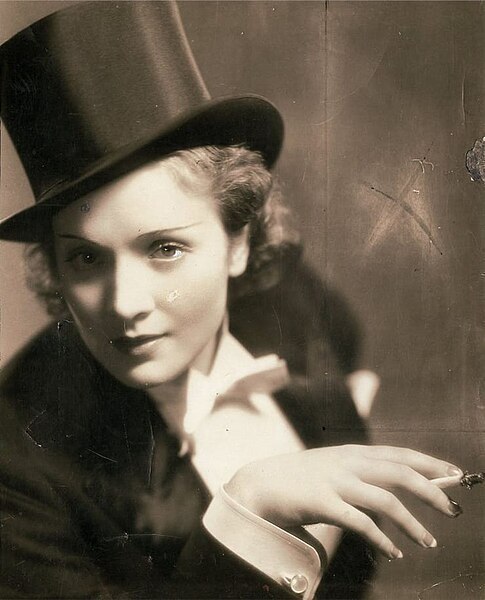
ms dietrich....ms dietrich pls.....sit on my face
its marlene dietrich!!!! queer legend, easily the hottest person to ever wear a tuxedo, that hot hot voice, those glamorous glamorous movies…. most famously she starred in a string of movies directed by josef von sternberg throughout the 1930s, beginning with the blue angel which catapulted her to stardom in the role of the cabaret singer lola lola. known for his exquisite eye for lighting, texture, imagery, von sternberg devoted himself over the course of their collaborations to acquiring exceptional skill at photographing dietrich herself in particular, a worthy direction in which to expend effort im sure we can all agree. she collaborated with many other great directors of the era as well, including rouben mamoulian (song of songs), frank borzage (desire), ernst lubitsch (angel), fritz lang (rancho notorious), and billy wilder (witness for the prosecution). the encyclopedia britannica entry im looking at while compiling this propaganda describes her as having an “aura of sophistication and languid sexuality” which✔️💯. born marie magdalene dietrich, she combined her first and middle names to coin the moniker “marlene”. she was a trendsetter in her incorporation of trousers, suits, and menswear into her wardrobe and her androgynous allure was often remarked upon. critic kenneth tynan wrote, “She has sex, but no particular gender. She has the bearing of a man; the characters she plays love power and wear trousers. Her masculinity appeals to women and her sexuality to men.” in the 1920s she enjoyed the vibrant queer nightlife of weimar berlin, visiting gay bars and drag balls, and in hollywood her love affairs with men and women were an open secret. she was an ardent opponent of nazi germany, refusing lucrative contacts offered her to make films there, raising money with billy wilder to help jews and dissidents escape, and undertaking extensive USO tours to entertain soldiers with an act that included her a playing musical saw and doing a mindreading routine she learned from orson welles. starting in the 50s and continuing into the mid-70s she worked largely as a cabaret artist touring the world to large audiences, employing burt bacharach as her musical arranger.
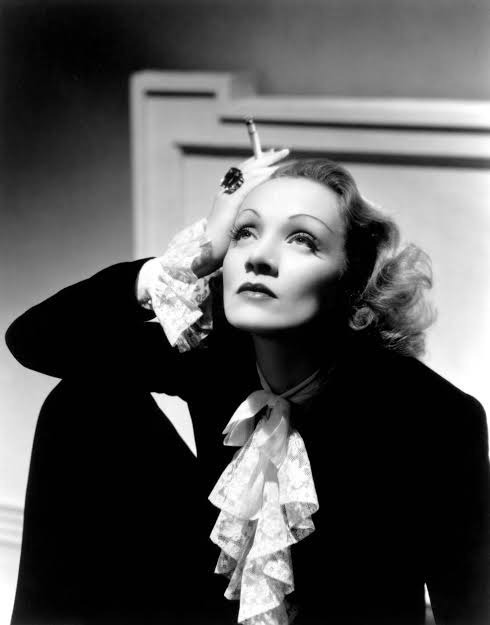
First of all, there are those publicity photos of her in a tux. Second of all, I have never been the same since knowing that she sent copies of those photos to her Berlin lovers signed "Daddy Marlene." Not only is she hot in all circumstances, but she can do everything from earthy to ice queen. Also, she kept getting sexy romantic lead parts in Hollywood after the age of 40, which would be rare even now. She hated Nazis, loved her friends, and had a sapphic social circle in Hollywood. She also had cheekbones that could cut glass and a voice that could melt you.
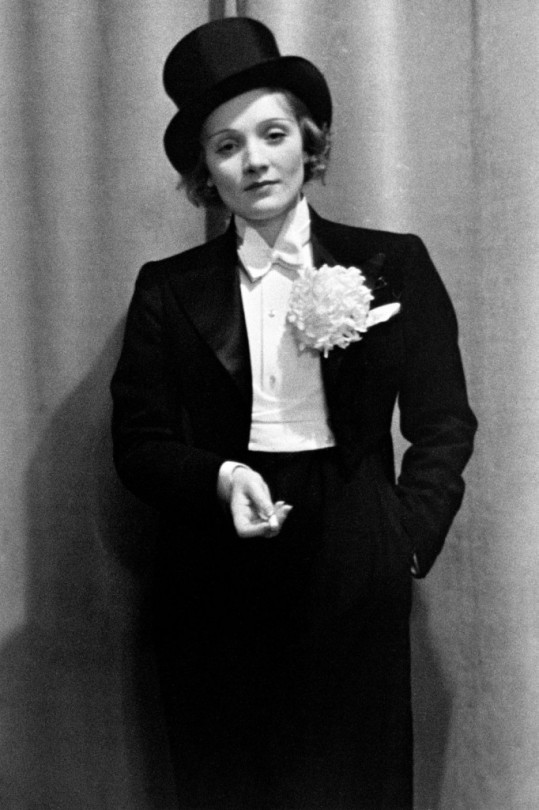
Her GENDER her looks her voice her everything
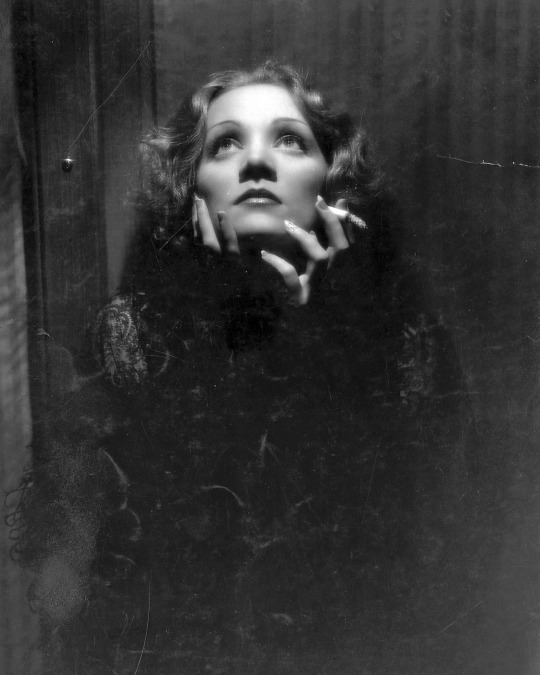
“In her films and record-breaking cabaret performances, Miss Dietrich artfully projected cool sophistication, self-mockery and infinite experience. Her sexuality was audacious, her wit was insolent and her manner was ageless. With a world-weary charm and a diaphanous gown showing off her celebrated legs, she was the quintessential cabaret entertainer of Weimar-era Germany.”
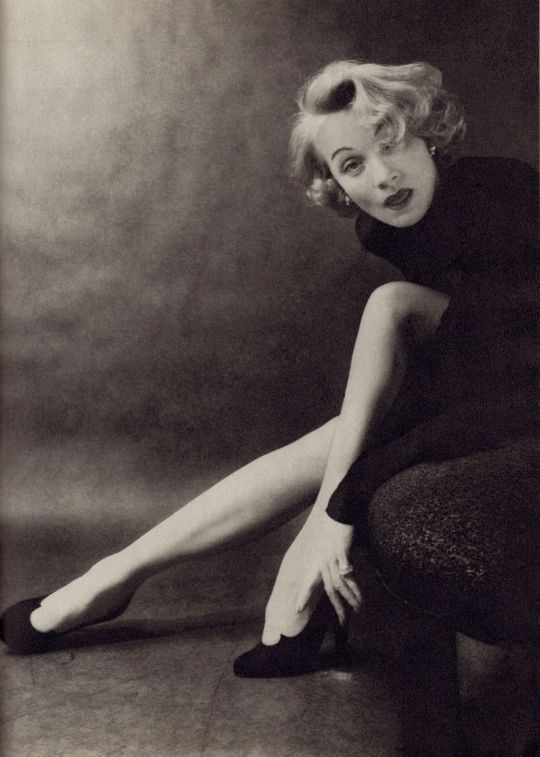
The bar scene in Morocco awoke something in me and ultimately changed my gender
youtube
"Her manner, the critic Kenneth Tynan wrote, was that of ‘a serpentine lasso whereby her voice casually winds itself around our most vulnerable fantasies.’ Her friend Maurice Chevalier said: ‘Dietrich is something that never existed before and may never exist again.’”
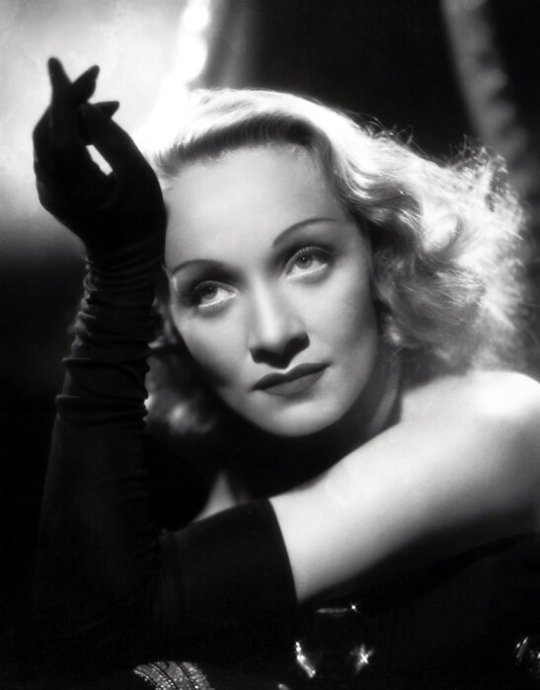
"Songstress, photographer, fashion icon, out bisexual phenom (notoriously stole Lupe Velez and Joan Crawford's men, and Errol Flynn's wife, had a torrid affair with Greta Garbo that ended in a 60-year feud, other notable conquests including Erich Maria Remarque -yes, the guy who wrote All Quiet on the Western Front- Douglas Fairbanks Junior, Claudette Colbert, Mercedes de Acosta, Edith Piaf), anti-Nazi activist. Marlene was a bitch - she had an open marriage for decades and one of her favorite things was making catty commentary about her current lover with her husband, and her relationship with her daughter was painful- but she was also immensely talented, a hard worker, an opponent of fascism and the hottest ice queen in Hollywood for a long time."
youtube
"She can sing! She can act! She told the Nazis to fuck off and became a US citizen out of spite! She worked with other German exiles to create a fund to help Jews and German dissidents escape (she donated an entire movie salary, about $450k, to the cause). She looks REALLY GOOD in a suit. If you're not convinced, please listen to her sing "Lili Marlene". Absolutely gorgeous woman with a gorgeous voice."
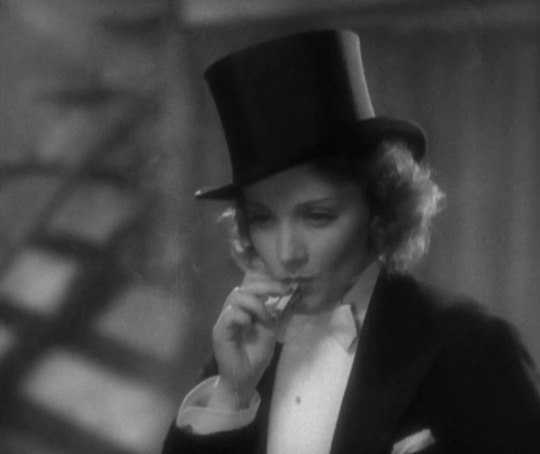
Gifset link
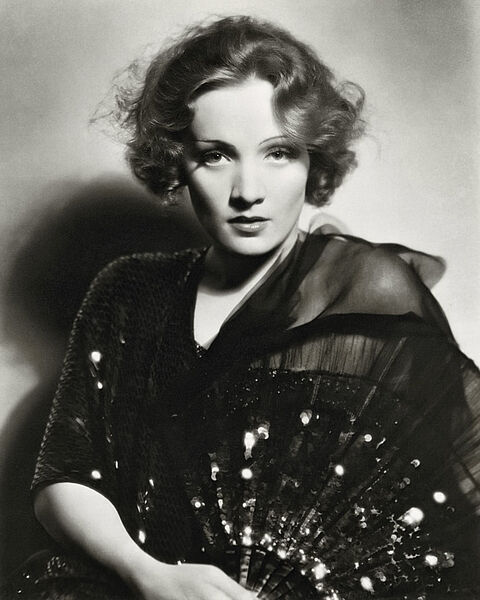
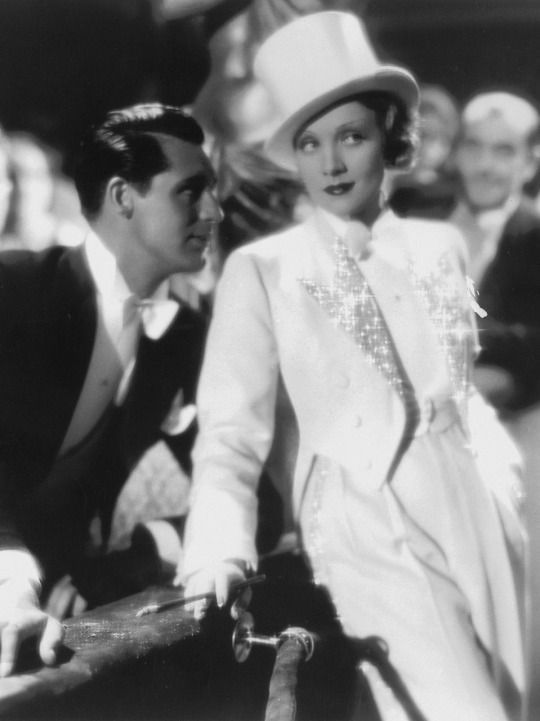
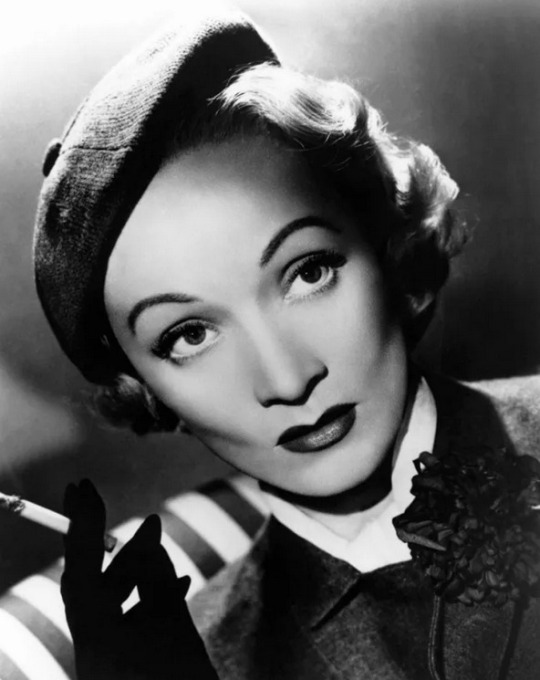
"Bisexual icon and Nazi-hater. Looks absolutely stunning in the suits she liked to wear. 'I dress for the image. Not for myself, not for the public, not for fashion, not for men'."
"would you not let her walk on you?"
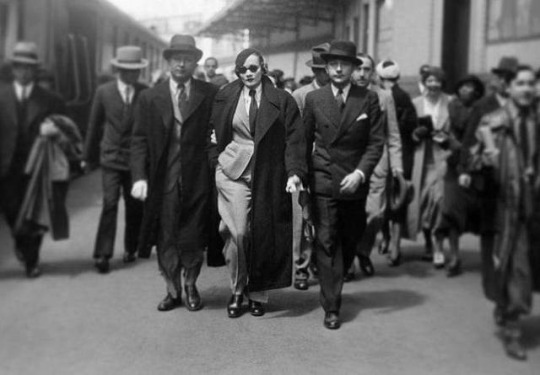
467 notes
·
View notes
Text
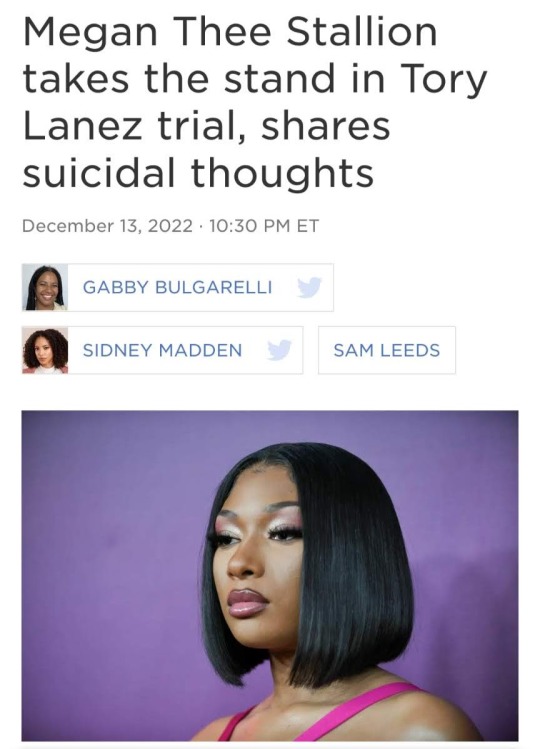
As the key witness for the prosecution, the Houston rapper, real name Megan Pete, described her account of night of July 12, 2020, saying on record that the assault was the result of an argument she had with Lanez, real name Daystar Peterson, and Kelsey Harris, her former best friend and assistant, while driving home from a Hollywood Hills pool party in the early morning hours.
Wearing a purple suit, red-bottom, black stilettos and a black bob hairstyle, Pete, 27, testified that the shooting and its aftermath have impacted her health, both physically and mentally. "I can't even be happy," she said, her voice breaking during her afternoon testimony. "I can't hold conversations with people for a long time. I don't feel like I want to be on this earth. I wish he would have just shot and killed me, if I knew I would have to go through this torture."
The Grammy winner recounted that she and Peterson had an intimate but not exclusive relationship in 2020, one that Harris did not know about at the time. Pete knew Harris had a "crush on" Tory, so she hid the relationship. (When asked specifically why she had not previously revealed the nature of her relationship with Peterson, Pete said she was embarrassed, "because it's disgusting at this point. How could I share my body with someone who could do this to me?")
The fight in the vehicle started when Peterson hinted at the relationship to Harris and then tried to pit the two women against each other, calling them "bitches and hoes" in the car.
Pete testified that, after exiting the vehicle for a second time on the drive home, Peterson shouted at her, "Dance, bitch," then fired five shots at her from the passenger side, striking her in the feet. "I felt shocked. I felt hurt. I wasn't sure if this was really happening. I looked at my feet, I saw the blood and I fell to the ground," the "WAP" star testified.
When expressly asked about changing her story to police the night of the shooting — from stepping in glass to allegedly being shot by Peterson — Pete gave context for her choice in the moment, starting with her distrust of the police.
"I don't feel safe in the car. I don't feel safe with the police," Pete said between tears as she described the aftermath of the incident, when responding officers had her, Peterson, Harris and Jaquan Smith, Peterson's bodyguard, step out of the vehicle they were stopped in.
Pete, who shared that she's grown up deeply suspicious of cops, said that wariness was further stoked by the 2020 climate, George Floyd's murder and subsequent Black Lives Matter protests: "In the Black community — in my community — it's not really acceptable to be cooperating with police officers."
Pete then spoke briefly about how "women aren't believed when they speak out." George Mgdesyan, Peterson's attorney, objected on the grounds that the comment was tangential to the case.
Beyond fear of the police and questions surrounding survivor credibility, Pete also shared the concern that implicating Peterson could negatively impact her career in hip-hop.
"This situation has only been worse for me and it has only made him more famous," Pete said during morning testimony. "Because I was shot, I've been turned into some kind of villain, and he's the victim. This has messed up my whole life ... This whole situation in the industry is like a big boy's club ... I'm telling on one of y'all friends, now you're all about to hate me."
(link)
7K notes
·
View notes
Note
Just curious, what’s your opinions on Kristoph and Phoenix? I see you reblog ship posts about them sometimes and I’m really curious about your opinions on their dynamic both inside and outside of ship stuff, because I didn’t really know how to interpret Kristoph in particular. I think he’s one of the worse villains in AA tbh, it’s been a while so I may be misremembering, but I just didn’t… get that much substance from him?
kristoph is certainly a really hard character for me to fully develop an opinion on in isolation. i think the only area where i'm capable of saying anything about him i can back up with significant references to the text is in regard to his relationship with phoenix, because that's where the meat of his character interactions are. and more broadly because as a #phoenixhead my primary means of looking at the entire franchise is how things relate to phoenix. if you'd like to read about my interpretation of phoenix and kristoph's relationship more specifically i've got a post on that subject here. i think it's a character dynamic that has a TON going for it relative to the screentime if you're able to disregard fanon and look directly at what's in the text.
but more on kristoph individually
kristoph suffers from the same thing that all of aa4's major characters and plotlines do: not getting another game. there was clearly more to the gavin brothers' story we didn't get and will never get, and knowing that there's Something there we have absolutely no means of predicting or unraveling makes it hard to theorize. he kind of exists in a quantum state for me where i can see a ton of alternate perspectives on his character's complexities and just buy whichever one i'm feeling at a given moment. i personally wouldn't say he lacks substance because every interaction he has with any other character is, imo, very compelling and gives me a lot to chew on. but he's a character that's all questions and no real conclusions for sure.
i don't think he's a cackling machiavellian serial abuser. i think hes easily the kind of person who has the capacity to be emotionally abusive and manipulative to the people closest to him without being Pure Evil. because we have so little on him it's very easy to portray kristoph as the kind of sinister that provides whatever OP's favorite flavor of angst is. and i'm certainly no exception to that; i just happen to be a person who is into maybe some subtler flavors.
he's both one of ace attorney's most calculated villains, with poisoning vera's nailpolish being an incredibly cold maneuver that suggests a lot of foresight, and one of ace attorney's most brutal murderers, capable of getting aggressive enough in a moment to bludgeon a man to death with a bottle. i think kristoph can be understood as a character whose primary motivation is control, both over himself and others. there's that critical line in turnabout succession where he tells klavier he's out of control, and klavier says "whos control? mine, or yours?" his reputation is built on his ability to stay calm under pressure, and his ability to stay calm under pressure is built on his tendencies to preemptively engineer situations in his favor. the stuff with phoenix and the gramarye case represents what we can presume to be the biggest failure of his career.
i think this puts him very much in line with AA1's main villains. people like to compare him to dahlia a lot for obvious reasons and there's some fun to be had there but i think it lets people overlook how well he ties into AA1. redd white controlled the press and controlled the judges to get away with his blackmail ring. von karma controlled the witnesses to engineer his perfect cases. damon gant controlled the police and the evidence, and then controlled lana to control the prosecution. although those were all one-case villains i think kristoph justifies his larger scope in aa4 by the significant and longstanding personal connections he has to the rest of the main cast. kristoph represents the mirror image of those AA1 villains; aa1 shows the way the deck is stacked against the defense. kristoph shows what it looks like when someone tries to stack it in the other direction
i think kristoph plays an important part in the larger franchise by showing what corruption looks like from the defense's bench, and how this corruption takes a different cadence when it lacks the systemic power that the villains like gant had. i think his cold, calculated approach to defense works well as a foil to the type of defending we saw from phoenix who is all heart and charges in head first. i think apollo works well representing a sort of compromise between the two, being a little bit shrewder than phoenix but no less earnest. i think klavier, then, as a prosecutor who is much less aggressive than the previous 3 both personally and professional serves to further invert the expectations set by the trilogy in a way that's really satisfying.
is kristoph missing some pretty critical backstory that i would love to see? yeah. absolutely. but i think when you look at him as a story device rather than an underdeveloped character he adds a tonnnnn to the series. that said, i will die wondering.
256 notes
·
View notes
Text
The Fuck's Up With Mammon?
Ok, so, in the grand history of Christian folklore, there are dozens of different ways that the society of Hell and its various demons can be structured. One of the most popular is The Seven Princes of Hell, which divides Hell between seven ruling demons, each of which represents the seven deadly sins (and is opposed by saints who represent the seven heavenly virtues). It's fun because it's got a solid theological theme and not too many working parts - seven is a more digestible number than nine or, like, however the fuck your sort out all the demons in the Lesser Key of Solomon, each of which has some arbitrary number of legions of demon soldiers under their command, and the deadly sins theme gives you a clear way to make each prince's domain stand out.
(Obviously I'm a bit biased here, since I used a modified version of the Seven Princes of Hell for my own story about demons, but still, I think the point stands.)
Now, who the seven princes of Hell are can differ. Binsfield, the guy who coined the name, lists them as follows:
Lucifer, Prince of Pride
Mammon, Prince of Greed
Asmodeus, Prince of Lust
Leviathan, Prince of Envy
Beelzebub, Prince of Gluttony
Satan, Prince of Wrath
Belphegor, Prince of Sloth
However, there are earlier versions of the seven princes that rearrange things. Beelzebub has been given the sin of Envy at times, Belphegor has been given gluttony, and both Belial and Abaddon/Apollyon have taken the role of prince of Sloth. With me so far?
Right, ok, so here's the thing: ALL of these demons have shit going on in folklore outside of their role as potential princes of Hell. Well, all except one. To wit:
Lucifer, despite being a translation error, quickly became the front-runner in the grand race of "Who is THE Devil in the Bible, i.e. the leader of Hell itself?" It helps that said translation error was made by King James in his version of the Bible, which, while a terrible translation, is an amazing piece of poetry in its own right and beloved by many Christians because of it. Notably, Lucifer is The Devil of Paradise Lost, which is up there with Dante's The Divine Comedy in being one of the most important and influential depictions of Hell of all time.
Beelzebub is one of the oldest demons in all of demonology, predating Christianity itself, and is pretty close to Lucifer in the race for "Who is THE Devil," with arguably a better claim to the position despite Lucifer being the more popular candidate for the role.
Satan gets kudos for being one of the few devils that's ACTUALLY named in the Bible... even if it's less a name in context and more a title akin to "prosecuting attorney." Because of that, he's arguably got the greatest claim to being The Devil, and in most works where a different devil gets the title, Satan is treated as one of his alternate titles anyway.
Asmodeus was set up in folklore to be The Devil, and has a pretty strong claim to the title because of that. He's also clearly what Dante based his description of the devil's physical appearance on, with his three different colored heads and all, and that gives him some major props.
Leviathan is also a rare demon who gets mentioned in the Bible, although in the Bible it's pretty clear he's not a demon but rather a big sea monster, and a lot of Christian folklore treats him as such instead of as a demon. So that's a pretty big "other thing going on" for him - sometimes he's not even a demon, but more of a godzilla.
Belphegor was mentioned in a good number of texts predating the concept of arranging demons by the seven deadly sins, and while he was mostly a minor demon (akin to most of the other residents of the Lesser Key of Solomon, like Shax or Marchosias or what have you), that's still something. Becoming a Prince of Hell gave him a greater claim to fame, but still, he had a career before it.
Abaddon/Apollyon is one of those demons whose name is ALSO a synonym for Hell itself, which is a pretty big deal. He can be a demon, or he can be hell, or he can be BOTH, like in the takes where Hell has a literal mouth to swallow sinners and is portrayed as kind of a living monster in its own right. He also got to be The Devil in Pilgrim's Progress, and that's pretty cool.
Belial is one of the absolute earliest demons, having been cast as The Devil in the Book of Enoch, which is kind of the O.G. Abrahamic demon story (as much as any written story could be the source of it, anyway). Thus, while Belial may not have the most popular claim to being The Devil, he arguably has the best claim to it, or at least the earliest. Also, Belial is just as often depicted as a lady demon as he is a male demon, which means Belial is the best candidate for a Princess of Hell.
But that leaves... Mammon. And as far as I can tell in all my research, Mammon's claim to fame is and has always been being the Demon of Greed. Like Lucifer, his existence is owed to a translation of the Bible personifying something that was not originally a person - "mammon" was just supposed to mean money and other material wealth, but then it became, well, Mammon, the demonic personification of Greed.
He's the demon who was made for his sin, rather than being given it after his creation. The only demon whose existence purely hinges on needing a personification of a sin, the only one who has no other shit going on. Lucifer, Beelzebub, Asmodeus, they all have rich histories as demons in folklore, but Mammon? He's just greed.
And that's weird to me. Were there no other, more popular demons who could embody the concept? How does Mammon feel having nothing else to him beyond his sin? It's kinda weird, right?
I've got no greater point to this, I just thought it'd be fun to share.
230 notes
·
View notes
Text
Some Law-Related Vocabulary
for your poem/story (pt. 3/4)
After-born - born after a certain event (as a father's death or the execution of a will)
Aliunde - from another source
Alluvion - material (as clay, silt, sand, or gravel) deposited by running water
Bona fide - characterized by good faith and lack of fraud or deceit; being real or genuine, sincere
Brain death - the final stopping of activity in the central nervous system especially as indicated by a flat electroencephalogram for a usually statutorily predetermined period of time
Cas fortuit - fortuitous event (i.e., an event of natural or human origin that could not have been reasonably foreseen or expected and is out of the control of the persons concerned)
Choice of evils defense - a defense to a criminal charge based on the assertion that the criminal act was committed to avoid the commission of an even greater evil
Civil fruit - the revenue derived from property especially by virtue of an obligation (as a lease)
Death with dignity law - a law legalizing the self-administration by a terminally ill person of life-ending medication prescribed by a physician; also called "right-to-die law"
Defalcation - failure to account for or pay over money that has been entrusted to one's care; a failure to meet a promise or an expectation
Embracery - an attempt to influence a jury corruptly
Evidentiary harpoon - evidence consisting especially of a police officer's statement that is improper and is knowingly offered by the prosecution to prejudice the defendant in the eyes of the jury
Ex aequo et bono - according to what is equitable and good
Excited utterance - a statement that concerns a startling event (as a physical assault) and that is made by a person while under stress caused by the event
Featherbedding - the unfair labor practice of causing an employer to pay for services which are not performed (as by requiring more workers than necessary)
Feticide - the act of causing the death of a fetus
Fishing expedition - an investigation that does not stick to a stated objective but hopes to uncover incriminating or newsworthy evidence
Flagrante delicto - in the very act of committing a misdeed; also: in the midst of sexual activity
Flat rule - a generalized rule applied without consideration for specific circumstances; called also "per se rule"
Gift inter vivos - a gift made during the lifetime of the donor and delivered with the intent of surrendering immediately and irrevocably dominion and control over the property
Hedonic damages - damages deemed to compensate for the loss of enjoyment of life resulting from a wrongful act
Inadvertent discovery - unexpected finding of incriminating evidence in plain view by the police
Mental cruelty - conduct by one spouse that renders the other's life miserable and unendurable and that is a ground for divorce
Mens rea - a culpable mental state
Noscitur a sociis - a doctrine or rule of construction: the meaning of an unclear or ambiguous word (as in a statute or contract) should be determined by considering the words with which it is associated in the context
Pecuniary - consisting of, measured in, or relating to money
Peonage - labor in a condition of servitude to extinguish a debt
Perils of the sea - perils that are peculiar to the sea but are of such an extraordinary nature and power that one cannot guard against them using ordinary skill and prudence
Quashal - an act of quashing something
Riparian - of or relating to or living or located on the bank of a watercourse (as a river or stream) or sometimes a lake
Scintilla - a small trace or barely perceptible amount of something (as evidence supporting a position)
Silent witness theory - a theory or rule in the law of evidence; photographic evidence (as photographs or videotapes) produced by a process whose reliability is established may be admitted as substantive evidence of what it depicts without the need for an eyewitness to verify the accuracy of its depiction
Vulture fund - an investment company that buys up bankrupt or insolvent companies with the goal of reorganizing them so they can be profitably resold as going concerns
Wrongful conception - a malpractice claim brought by the parents of a healthy but unwanted child usually against a physician or health-care provider for alleged negligence in performing a sterilization or abortion procedure and sometimes against a pharmacist or pharmaceutical manufacturer of contraceptives; also called "wrongful pregnancy"
Youthful offender - a young person (as one within a statutorily specified age range) who commits a crime but is granted special status entitling him or her to a more lenient punishment (as one involving probation or confinement in a special youth correctional facility) than would otherwise be available
If any of these words make their way into your next poem/story, please tag me, or leave a link in the replies. I would love to read them!
More: Law-Related Words
More: Word Lists
#word list#law#terminology#writeblr#langblr#linguistics#studyblr#literature#writers on tumblr#writing prompt#poets on tumblr#dark academia#spilled ink#writing reference#poetry#light academia#creative writing#writing inspiration#writing inspo#writing ideas#writing resources
125 notes
·
View notes
Text
Vero Amore - Theodore Nott X Reader (Part 4)
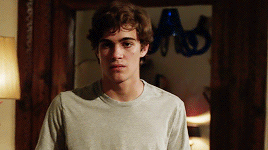
Summary: Theodore is on trial for being associated with voldemort due to his father and family history, His odds arent looking so good. Luckily for him you are called to the stand to testify on his behalf, and you just might be the key to his innocence.
Fluff, established previous relationship, Exbf!Theo, Older!Theo and others. Post hogwarts.
Previous part here
The prosecution had painted Theodore as a greedy criminal, despite his previously spotless record. It was all about the chatter, and breaking away from the path his father had paved for him would have proven to be difficult. You were ushered back to your seat, away from the center of the courtroom. a mixture of skeptical and sympathetic faces passed you by, if these people wanted a love story, they got one. there was not a single ounce of dishonesty in either you or Theodore, or any of his witnesses'.
During closing arguments, Your escort gave an impassioned plea about Theodore's outstanding character and the complete lack of real evidence against him. The prosecution tried its best to poke holes, but their arguments rang hollow after everything. and it was now in the hands of the jury, you hoped and prayed they would be forgiving. After just an hour of deliberation, the jury returned with a verdict of not guilty on all charges and accounts. You finally let out the breath that felt like you had been holding for months. His life and reputation had been salvaged, he was no longer tied to his past. and he would not have to be sent away to suffer for his fathers wrongdoings. you were overjoyed, elated to be able to see him one day do all of the things he always dreamt of. Once the court was dismissed, you scurried over to Theodore to embrace him, he picked you up into the embrace, holding you closely with a huge breath of relief and fresh air. Blaise appeared, he had been sitting quietly somewhere in the courtroom, though you hadn't noticed. "I told you it wouldn't be so bad." he assured Theodore with a stern pat on the back. Theodore was practically in tears, happiness. "I'm so shocked," Theodore says, the courtroom is now being emptied. you are all being ushered to leave.
As the three of you continue forward into the lobby, Theodore lets out a heavy sigh. He says your name, gently. "I'm so happy you are here," he begins. "Thank you, so much. I am indebted to you." he says. You smile softly. "You don't have to thank me," you say. "I'm glad I could be here." you say.
After a sentimental moment between the two of you, Blaise is quick to leave. "I do have to get work now, but I'll leave you two to have a more proper reunion." he says. "It was great to see you again," you say politely. Blaise was never super close to you, although you were cordial since he was friends with theo. "Thanks, for everything. We'll celebrate at my place later, yeah?" he says, Blaise nods, and then is off.
"I don't suppose you have plans after this?" Theodore asks you as you both walk, exiting the ministry building spilling onto the busy street. "No, actually, my calendar is clear for the day." you explain. "Would you like to come to my place? we can catch up- I'd just like to properly thank you for being there today." he says, his hands reaching for his pockets. "That sounds really nice actually." you agree.
Before too long you are at Theo's small flat. It's messy and lived in. "Sorry it's a mess." he says. "But it's home." for someone that grew up a pureblood slytherin who was well off financially, it was quite modest. "It's fine. I don't mind it." you say, sitting at the kitchen island. Theo is standing on the other side. "Would you like a drink?" he offers. "sure" you say. Although you are both happy that he is now a free man, there is still a slight tension from spending so many years apart after school. you are both attempting to make up for the lost years. Theo offers you a glass with some tea, your favorite kind. He's incredibly thoughtful. "What happened to your father?" you ask, after some contemplation. "After the war, he realized he would be prosecuted. He attempted to flee to America, but he was caught and he passed shortly after." Theo says.
"I'm sorry to hear that." you say. "It's alright, I don't miss him. but he's the only family I ever had." he says sadly. "That isn't true," you retort. "You have draco, pansy, and blaise." you thought. "and me." you say softly. Theodore gives a grateful smile. there's a special exchange between you. His mother passed away when he was young and his father was awful... "The past few years have been rough," he sighs, running his fingers through his hair. "with the trial dragging on for so long, and with everyone busy moving on with their lives I always felt like I was stuck back in time... It's been really lonely." he says. "Sometimes I think back," you begin. "and I remember all the things we did, all the fun we had. Laughter, Tears, all of it. I'm sad it's gone now, but I'm grateful that it happened. Those are my best memories." you admit. "Seeing us in those memories kind of changed me." Theodore admits, biting his lip slightly. there is uncertainty. "What do you mean?" you question."I just meant that," he begins, but he back tracks, his hands resting on the counter behind him as he leaned back, his arms stiff. "I've been really lonely and part of that has to do with missing you." he exclaims. "For a long time I absolutely hated myself for leaving you there like that without an explanation, knowing that I ruined one of the best things I've ever had in my life. For a while I couldn't get out of bed, It was so heavy. But I asked you here today so that I could just let you know I'm sorry for that." His head is low, he's ashamed of himself. "Theodore, you don't have to apologize for that." He shook his head. "I do when I've thought about it almost everyday for years." he manages to say softly. "We all did things we aren't proud of, there was a war happening," you say. "That doesn't matter, but I am sorry," he says.
You shift in your seat, taking a sip of your tea and placing the cup on the counter. you swing your feet over the edge, and you are now standing in front of Theodore. "I know that you had to do that," you comfort. "You had no other choice to survive. and that's okay." you comfort the man in front of you. "And by the way, I thought about you too. a lot. an embarrassing amount. But I wanted you to grow, even if that meant leaving me to do so." you say. Theodore is speechless, he feels like the same teenager he was all those years ago, scared to say anything. so he didn't, he pulled himself forward to place a gentle kiss on your lips.
#reader insert#my writing#x reader#hp x reader#hp#slytherin x reader#theodore nott x reader#theodore nott x y/n#theodore nott
83 notes
·
View notes
Text
Rod Serling Vs. Raymond Burr


Propaganda
Rod Serling - (The Twilight Zone) - Imagine, if you will, a man taking on issues of totalitarianism and censorship in Cold War America...
Raymond Burr - (Perry Mason, Ironside) - "He's arguably best known for film roles... but you have got to see him as Perry Mason. Defense attorney constantly dropped into "easy win for the prosecution" cases and flips them upside down. Maybe not exactly conventionally handsome, but rugged. He has this private little smile when he's about to grab a loophole or mistake the prosecution or a witness has just left for him that I find very endearing..." Full text propaganda included below the cut
- No Negative Propaganda Please -
Master Poll List | How to submit propaganda | What is vintage? (FAQ)
Additional propaganda below the cut
Rod Serling:



"The writer’s role is to menace the public’s conscience. He must have a position, a point of view. He must see the arts as a vehicle of social criticism and he must focus on the issues of his time." -Rod Serling



Raymond Burr:
He's arguably best known for film roles... but you have got to see him as Perry Mason. Defense attorney constantly dropped into "easy win for the prosecution" cases and flips them upside down. Maybe not exactly conventionally handsome, but rugged. He has this private little smile when he's about to grab a loophole or mistake the prosecution or a witness has just left for him that I find very endearing. (I haven't seen any of Ironside so I can't speak on his performance there, but I think it's necessary to include in the submission because while he wasn't actually a wheelchair user in real life, it was the first ever crime show with a disabled main character and I genuinely can't think of another show like that with a *title* character using a wheelchair, particularly of the 60s and 70s.)

This guy had a million hobbies including orchid cultivation, stamp collecting, winemaking, raising cattle and sheep, and founded an association that created a dictionary of the Fijian language. He was a big animal guy and had - from what I've been able to tell - at least a couple dogs (he's noted as one of the first people to import Portuguese Water Dogs to North America), some cats, and a duck. He gave insane amounts of money to charities and was recorded as having sponsored at least 26 foster children with medical needs. He spoke openly about lifelong struggles with weight & image (and about the difficulty of finding acting work when you don't fit the studio hottie build, they made him lose 60+ pounds before they would cast him as Mason despite outperforming their other option in court scenes) and rejected every offer to do a particular popular talk show after the host had started making multiple unprompted jokes about him and his weight. He created numerous inconsistencies in his own life story that, after his death & revelation of a 30+ year relationship with a man he had met during the filming of Perry Mason, have been assumed by both press and people that knew him as intentional exaggeration to keep suspicion of homosexuality low. Absolutely fascinating guy to me, every new fact I learn about him boggles.
84 notes
·
View notes
Text

Agatha Christie Books in Order.
Hercule Poirot Books
Hercule Poirot Collections
Miss Marple Books
Miss Marple Collections
Tommy and Tuppence Books
Tommy and Tuppence Collections
Superintendent Battle Books
Standalone Novels
Short Story Collections
Non-Fiction Books
Agatha Christie Hercule Poirot books in order
Here are the names of Agatha Christie’s Hercule Poirot books in order. It will help you start with your reading while ensuring the best experience.
The Mysterious Affair at Styles (1920)
The Murder on the Links (1923)
The Murder of Roger Ackroyd (1926)
The Big Four (1927)
The Mystery of the Blue Train (1928)
Peril at End House (1932)
Lord Edgware Dies (1933)
Murder on the Orient Express (1934)
Three Act Tragedy (1935)
Death in the Clouds (1935)
The A.B.C. Murders (1936)
Murder in Mesopotamia (1936)
Cards on the Table (1936)
Dumb Witness (1937)
Death on the Nile (1937)
Appointment with Death (1938)
Hercule Poirot’s Christmas (1938)
One, Two, Buckle My Shoe (1940)
Sad Cypress (1940)
Evil Under the Sun (1941)
Five Little Pigs (1942)
The Hollow (1946)
Taken at the Flood (1948)
Mrs. McGinty’s Dead (1952)
After the Funeral (1953)
Hickory Dickory Dock (1955)
Dead Man’s Folly (1956)
Cat Among the Pigeons (1959)
The Clocks (1963)
Third Girl (1966)
Hallowe’en Party (1969)
Elephants Can Remember (1972)
Curtain (1975)
The Monogram Murders (2014)
Agatha Christie Hercule Poirot Collections in Order
Poirot Investigates (1924)
Murder in the Mews (1937)
The Labours of Hercules (1947)
Poirot’s Early Cases (1974)
Agatha Christie Miss Marple Books in Order
Here is the list of Agatha Christie’s books in order based on their publication date.
The Murder at the Vicarage (1930)
The Body in the Library (1942)
The Moving Finger (1942)
A Murder is Announced (1950)
They Do It with Mirrors (1952)
A Pocket Full of Rye (1953)
4:50 From Paddington (1957)
The Mirror Crack’d (1962)
A Caribbean Mystery (1964)
At Bertram’s Hotel (1965)
Nemesis (1971)
Sleeping Murder (1976)
Agatha Christie Miss Marple Collection in Order
The Thirteen Problems (1932)
Miss Marple’s Final Cases (1979)
Agatha Christie’s Tommy and Tuppence Books in Order
Here’s the list of Agatha Christie Tommy and Tuppence Books in Order
The Secret Adversary (1922)
N or M? (1941)
By the Pricking of My Thumbs (1968)
Postern of Fate (1973)
Agatha Christie’s Tommy and Tuppence Collections in Order
Partners in Crime (1929)
Agatha Christie’s Superintendent Battle Books in Order
Here’s the list of Agatha Christie Superintendent Battle Books in Order
The Secret of Chimneys (1925)
The Seven Dials Mystery (1929)
Cards on the Table (1936)
Murder is Easy (1939)
Towards Zero (1944)
Agatha Christie’s Standalone Novels in Order
Here’s the list of Agatha Christie Standalone Novels in Order
The Man in the Brown Suit (1924)
Giant’s Bread (1930)
The Sittaford Mystery (1931)
Unfinished Portrait (1934)
Why Didn’t They Ask Evans? (1934)
And Then There Were None (1939)
Absent in the Spring (1944)
Death Comes as the End (1944)
Sparkling Cyanide (1945)
The Rose and the Yew Tree (1948)
Crooked House (1949)
They Came to Baghdad (1951)
A Daughter’s a Daughter (1952)
Destination Unknown (1954)
The Burden (1956)
Ordeal by Innocence (1958)
The Pale Horse (1961)
Endless Night (1967)
13 at Dinner (1969)
Passenger to Frankfurt (1970)
The Murder at Hazelmoor (1984)
Agatha Christie’s Short Story Collections in Order
Here’s the list of Agatha Christie Short Story Collections in Order
The Mysterious Mr. Quin (1930)
The Hound of Death (1933)
The Listerdale Mystery (1934)
Parker Pyne Investigates (1934)
The Regetta Mystery and Other Stories (1939)
The Witness for the Prosecution and Other Stories (1948)
Three Blind Mice and Other Stories (1950)
The Under Dog and Other Stories (1951)
The Adventure of the Christmas Pudding (1960)
Double Sin and Other Stories (1961)
Star Over Bethlehem and Other Stories (1965)
The Golden Ball and Other Stories (1974)
The problem at Pollensa Bay and Other Stories (1991)
The Harlequin Tea Set (1997)
While the Light Lasts and Other Stories (1997)
Agatha Christie’s Non-Fiction Books in Order
Here’s the list of Agatha Christie Non-Fiction Books in Order
Come, Tell Me How You Live (1946)
Agatha Christie: An Autobiography (1977)
Top 10 Agatha Christie Books to Read
Given the number of books in the Agatha Christie series, readers generally hesitate to begin. Further, to understand the series well, one needs to read Agatha Christie’s novels in order. To ease things, the readers generally look for the best novels or books to read them directly and avoid all the hassle. So here are the top 10 Agatha Christie novels that will offer you the best mystery story reading experience.
#agatha christie#poirot#hercule poirot#miss marple#tommy and tuppence#superintendent battle#literature#english literature#books#classics#crime novles#1920s#1930s#1940s#1950s#1960s#1970s#vintage
105 notes
·
View notes
Text
Sorry for the very late post! I had to change my plans, because I wanted to talk about someone else but changed my mind for some reasons ; so I had to find another story and rewrite everything.
This time, the post isn’t going to be about one woman, but two. Last year, I had already made a post about these two women, but I couldn't just not talk about them this month given how amazing their story is.
Here is the story of :
Elisa and Marcela !
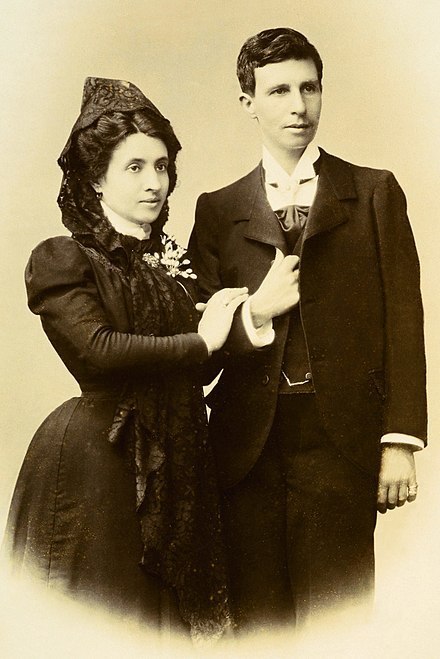
Marcela Gracia Ibeas and Elisa Sánchez Loriga got married on June 8, 1901, in A Coruña, at Galicia, in Spain. Their marriage was the first homosexual marriage in Spain since the Roman imperial era and happened more than 100 years before the country legalized homosexual marriages !
To achieve this, Elisa disguised herself as a man, and adopted a male identity, Mario Sánchez, which is the name on their marriage certificate. Their lie was later discovered, but their marriage was never annulled, and they remained married for the rest of their lives.
There is a Netflix movie about them if you want to see it. Though it has it flaws, I personally enjoyed it a lot, and from what I know, it is not too bad historically speaking. There's just one thing that happens in the movie that we are far from sure happened in real life. (I personally do not believe it did) Here's the trailer if you are interested! It's a very good movie in my opinion!
(But if you plan to watch it, maybe you shouldn't read the rest of the post as it's gonna spoil you everything lol)
The two young women met at the teacher training college in La Coruña. Marcela, 18, is a student there, while Elisa, 23, works there after completing the same course. They become friends, then lovers. Marcela's parents, fearing a scandal, send their daughter to study in Madrid, but this is not enough to put an end to their romance. Marcela is appointed teacher in Vimianzo, in the village of Calo, while Elisa, not far from there, works as a temporary replacement in Couso. They decided to live together in Calo until 1889, when Marcela left to teach in Dumbría, while Elisa remained in Calo. They kept in touch, writing to each other, until Elisa joined Marcela.
They live their love for years, hiding their relationship, until they get fed up and decide to hatch a plan to get married.
In 1901, Elisa adopted a masculine appearance. She created a past for herself based on a cousin who died in a shipwreck, and claimed to have spent her childhood in London with an atheist father. She was baptized as Mario on May 26, 1901, and made her First Communion under the same identity.
The couple married on June 8, 1901. A brief wedding ceremony was performed before witnesses, and the couple spent their wedding night in the Corcubión inn on Calle de San Andrés - Elisa and Marcela were officially the first Spanish homosexual couple to marry. Their plan was a success.
Unfortunately, the villagers began to have doubts and realized that this marriage was what they called "a marriage without a man".
The Galician and Madrid press reported the affair, and the two women lost their jobs, were excommunicated and placed under arrest.
Here's a picture of them after their arrest :
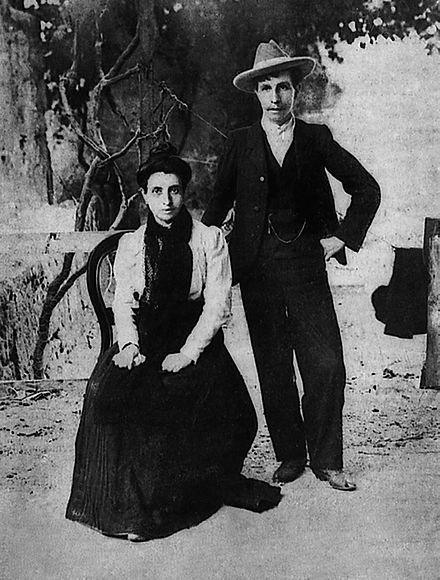
Despite this, and attempts by the Guardia Civil to prosecute them, their marriage was never annulled, and the two lovers managed to run away. Their story became famous in Spain and many other European countries.
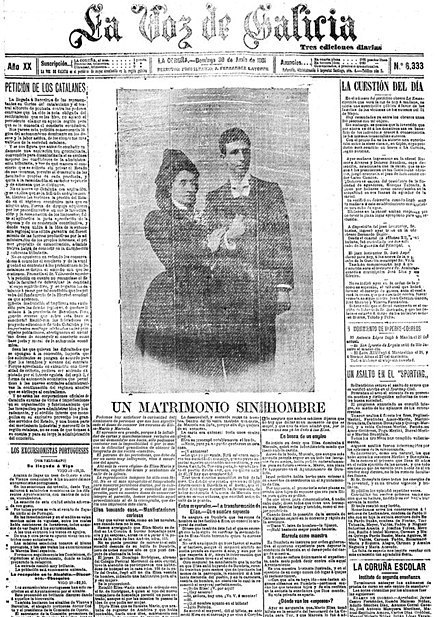
(Un matrimonio sin hombre = a marriage without a man)
After that, we don't know what happened to them. The last thing we know fore sure about them is that they embarked on a ship bound for South America - perhaps Argentina, like so many other Spaniards of the time, where they spent their honeymoon and settled.
A book published in 2008 tries to tell their story after they left Spain for Argentina, but this books seems suspicious to a lot of people, including me, and I don't trust it so I am not going to talk about it but finding informations about it is easy if you are interested !
Anyway, this story is just incredible!!! It is so so important in lesbian history (though we do not really know if they were lesbian or bisexual. Elisa was probably a lesbian, but the book, based on some rumours, claimed that Marcela slept with a man in order to have a child, so she might have been bi if it is true) and so, so interesting. I can't believe it's not like 100× more famous. The fact that two women got married in 1901!!! Whith one of them dressed as a guy! I love it.
82 notes
·
View notes
Text
Mary L. Trump at The Good in Us Substack:
Normally, my issue with the corporate media is their failure to shine a light on stories that matter. But in this case, it seems some segments of the corporate media, primarily Fox, is hellbent on helping Donald interfere with his trial through jury intimidation. It’s a disturbing reality that we must confront.
Last night, Donald Trump posted the following on social media:
“They are catching undercover liberal activists lying to the judge,” Jesse Watters.
Lawyers and legal analysts like Ryan Goodman and Andrew Weissman made it clear that this was a serious breach, the most serious to date, of Judge Merchan’s gag order – one that should be dressed immediately.
The fact that Donald was quoting somebody else is irrelevant. This seemed to be a blatant case of jury tampering, especially since, at the time of this was posted, five jurors and all six alternates remained to be chosen.
I fully expected today’s proceedings to begin with the judge announcing that the so-called Sandoval hearing, which he originally scheduled, would be held today before any other court business. This seemed to be a reasonable assumption considering the purpose of that hearing was so the judge can rule on the prosecution’s contention that Donald should be held in contempt and sanctioned accordingly.
Juror Number 2 dismissed
It’s not uncommon for a juror to be chosen and subsequently let go during the selection process. That was the case with Juror Four after the prosecution discovered the man may have been untruthful in some of his answers.
Juror Two’s circumstances were different. She was excused after telling the court that she’d become concerned that her identity might be discovered after her family and friends questioned her about her possible involvement in the trial following media coverage.
The fact that the judge felt the need to keep the identities of jurors anonymous is a damning indictment of the criminal defendant. And clearly the jurors understand the inherent danger of being seated on this jury.
To put this in perspective, my friend and former U.S. Attorney, Joyce White Vance explained, “Typically, you would only see that happen in a case involving violent organized crime.”
Following the juror’s feedback, Judge Merchan reprimanded the press for reporting far too much information about the jurors. [Out of an abundance of caution, I deleted the section about the jurors from last night’s post.]
[...]
In a disturbing display of media influence, Fox host Jesse Watters went through the list of jurors, with identifying characteristics like employment, gender, place of residence, and commented on each one.
Watters then singled out any jurors who didn’t align with his idea of what a juror should be (pro-Donald) and cast doubt on their ability to be fair and impartial. This is not just unethical, it’s dangerous. Fox, on Donald’s behalf, is actively helping Donald create an atmosphere of fear among the jurors.
In a just world, Watters would be fired for his irresponsible behavior, but Fox has no interest in justice.
Consider what Josh Kovensky of Talking Points Memo, pointed out:
“Instead of operating within the process of jury selection, which assumes that people are capable of setting aside whatever political beliefs or biases they may have in order to render a good faith judgment on the evidence, it casts the assumptions underlying that process as Trump’s enemy to be defeated, implying that the jurors themselves are incapable of both being impartial in their judgment of him and participating in a political system in which he is a main actor.”
[...]
Donald amplifies Fox, scares a juror, and breaks his gag order
So far, here’s the pattern: A Fox personality attacks the judge or jury, and then Donald shares it on Truth Social as a way to give himself plausible deniability: He can distance himself from the quote by saying it doesn’t represent what he actually believes.
This is exactly what he did last night when he quoted Jesse Watters.
Regardless of Donald’s attempts to pretend otherwise, this is a clear violation of his gag order and shows a blatant disregard for the legal process. He needs to be punished or this will spiral out of control quickly. We’re already seeing that his disrespectful behavior in the courtroom and flouting of norms — like refusing to stand when the prospective jurors enter the room or using his phone when nobody else is —has already gone too far.
The gag order was imposed to prevent Donald from publicly speaking about witnesses, jurors, court staff and their families outside of the courtroom. Donald has run out of chances and his downfall will be of his own making.
[...]
Judge Merchan must lay the smackdown on Donald
Prosecutors have accused Donald of violating the court-imposed gag order SEVEN times since the commencement of the trial. And they will have a chance to make the case for Donald to be held accountable during a hearing next week.
They have pointed to public statements and social media posts made by Donald over the past few days as evidence of these violations. They have described the situation as “ridiculous” and have called for it to stop, expressing frustration over Donald’s repeated breaches of the order.
Former federal prosecutor Shannon Wu has now called on Merchan to strengthen the gag order to any communication about the trial beyond Donald saying he’s innocent and plans to defend himself.
At the very least, Judge Merchan needs to be unequivocal in telling Donald and defense counsel that enough is enough. The repeated violations of the gag order and Donald’s attempts to interfere with the trial warrant serious repercussions. He cannot keep getting away with it.
Mary L. Trump writes in her Substack on how right-wing media outlets (esp. Fox's Jesse Watters) and Donald Trump are conducting witness tampering on the jury for the Trump falsification of business records trial. Trump Trial
#Jury Tampering#Witness Tampering#Donald Trump#Jesse Watters#People of New York v. Trump#Donald Trump Trial#Juan Manuel Merchan#Mary L. Trump#Mary Trump
82 notes
·
View notes
Text

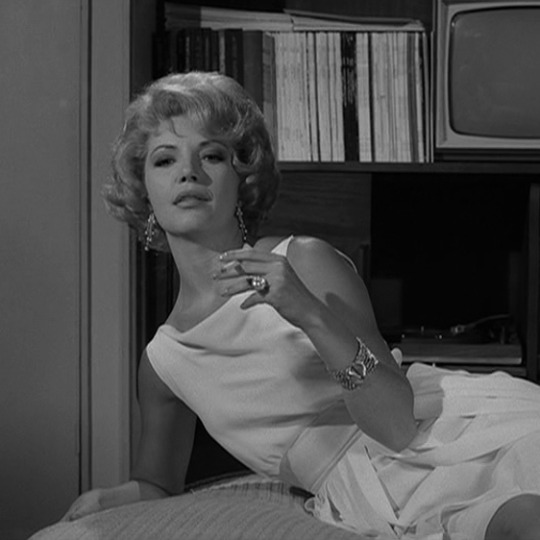
Propaganda
Rita Hayworth (Gilda, Cover Girl)—Absolutely, drop-dead gorgeous. She steals every movie she’s in; she was Fred Astaire’s favorite dance partner, as you can see in clips from their movies [link][link]. Born Margarita Carmen Cansino, Rita's story had its tragedies—her father was awful and had her performing in nightclubs way, way too young; the studio totally remade her look because they were afraid of her hispanic image, putting her through painful treatments and diets; she had a string of failed marriages. But beside all that, I think there's something about Rita that still glows through—an inner beauty that has nothing to do with the studio, or the men who pinned their dreams on her. Rita brings an incandescence to roles that's impossible to replicate, and was truly a great actress in that she could switch from herself—shy Margarita—into a bold and glamorous femme fatale so convincingly everyone fell in love with her as Gilda. She's my favorite movie star, and I think she was a beautiful human through and through—Rita, gorgeous and real and shining bright.
Ruta Lee (Seven Brides for Seven Brothers, Witness for the Prosecution)— She was a memorable part of a very memorable movie and she was out there with Hollywood legends and still made an impression on me. And also she's soooo pretty
This is round 1 of the tournament. All other polls in this bracket can be found here. Please reblog with further support of your beloved hot sexy vintage woman.
[additional propaganda submitted under the cut.]
Ruta Lee:
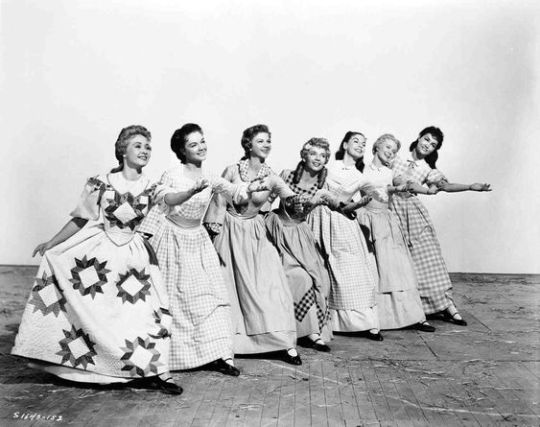
Rita Hayworth propaganda:
Do you need any other propaganda? Here’s the video.
youtube
She was not called "the love goddess" for nothing: beautiful, glamorous, despite playing sexy and provocative roles her inherent shyness somehow also would shine through sometimes, creating this contradictory and incredibly attractive image

Often played "the bad girl" who tempted the male hero away from "the good girl"; but did have roles that broke her out of that mold. She was also the inspiration for Jessica Rabbit. THE pinup girlie.

She was soo beautiful when she was young and she MAINTAINED that beauty into her later years and I think that old lady glamour is hot. bombastic sex appeal
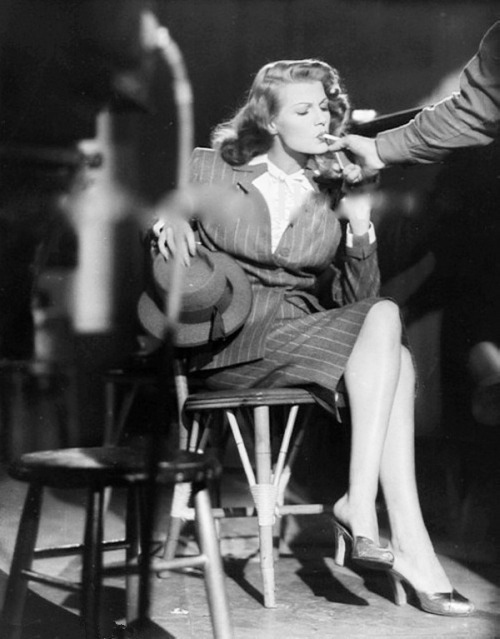
HELP
youtube
every line she delivers in gilda is so flirty and passionate or absolutely desolate and it's so good
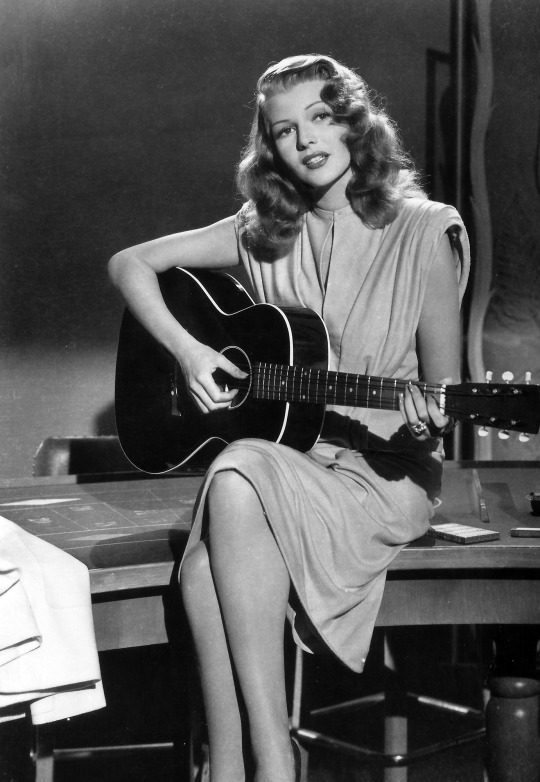
I just have a lot of feelings about her
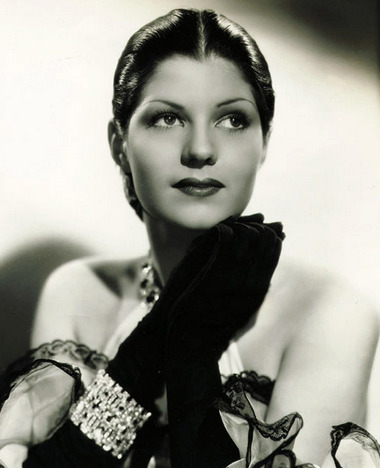
181 notes
·
View notes
Text
Simon Blackquill having to prosecute other innocent people is such an interesting thought. Like, I'm sure there are a lot of cases where he didn't know they were innocent, especially when some of the solutions in ace attorney require more red thread on the conspiracy board then any normal person would jump to, but then there would be other cases.
Cases where even if Simon doesn't know they are innocent, certainly knows the police didn't do their due diligence. Cases where it's questionable if the suspect had the means to commit these crimes. Cases where no reasonable man, woman or child would assume that they were guilty. Cases like Maya's first trial, where it's painfully obvious that they arrested her just for being there, and would have arrested Phoenix if he had been just a little less lucky, (later he was accused anyway but you know) and only got the evidence for it after deciding it was an open and shut case. (Love you gumshoe, but come on. Question her first at least)
It makes me wonder what goes through his head in AA5, specifically the middle two cases.
For Themis, Juniper is our suspect because she was able to freely move about the place during the mock trial, and it mostly followed her script, but why would she do that? It reeks of a frame up, the kind you read in a detective story (which this is, but as lawyers) there isn't a solid motive for WHY she would painstakingly arrange the crime scene, especially when she's also doing the technical work for the mock trial. Also, you mean to tell me they tracked every member of the student body? No one was in the bathroom? No one slipped out to take a phone call? There's literally no one else who could have? Makes sense from a story telling perspective, sure, too many characters otherwise, but there's a reason both Robin and Hugh become suspect before long. Then we start going in circles, and Simon knows it. He says as much, proceeding to go for a walk while we wear ourselves out.
But the other case, in Ninetales Vale, with the Tenmas.
For the Tenmas, did he not wonder how the mayor got knocked out? How unreliable filich seemed as a witness when testifying no one else was around? But then, they had a confession.
They had a confession.
Seven years prior they had had a confession.
There were no obvious second suspects then, either.
44 notes
·
View notes
Text
MAJOR APOLLO JUSTICE: ACE ATTORNEY SPOILERS
So, I didn’t like AJ:AA as much as I thought I would.
Keep in mind that my prior experience with Ace Attorney (AA) before this was the Phoenix Wright Ace Attorney Trilogy (1-3) and The Great Ace Attorney (TGAA) Chronicles, so I had very high standards. I’m a PC guy, so I just play the games when they get ported over. Also, I haven’t seen much discourse about this game, so I have no idea if my thoughts are a brand new hot take or the same stuff people have been saying for years. That said, here are my very long and drawn-out thoughts about Apollo Justice: Ace Attorney.

Apollo Justice is (not) doing fine.
Apollo Justice is a new defense attorney and the protagonist of this game, following up Phoenix Wright from the first three AA games. These are major shoes to fill, but moving to a new protagonist made sense - they essentially finished Phoenix’s story in the previous game in the series. Justice is a less experienced attorney than Wright, so of course he’d trip up a bit in court and occasionally fold under the tremendous pressure of prosecutor and air guitar extraordinaire Klavier Gavin (more on him later). However, I’m sure the writers could have handled this in a way that feels less frustrating to the player.
Most of the time, Justice appears helpless in the courtroom. He tries his best, but is ultimately forced into a corner by the prosecution. Ace Attorney cases are typically a constant back-and-forth between the defense and prosecution: the prosecution embarasses the defense, then the defense has a revelation and dominates the prosecution, then the prosecution dismantles the defense’s theory and forces them back into a corner, and the process repeats until a Not Guilty verdict is reached (with few exceptions). However, Justice tends to spend significantly more time crying in the corner than making a case for himself. Apollo certainly has his moments, but they felt far and few between. Half of Apollo’s gimmick is his “Chords of Steel,” or his incredibly loud voice. Even if he has nothing to say, let my man shout. His mentor is THE Phoenix Wright, after all - let Justice bluff a bit, even if it doesn’t always work out at first.
The other half of his gimmick is his bracelet, which lets him find minute details of a person’s body language, and use that discovery to pull the person into the shadow realm to question them and extract the truth. This is a really creative idea which breathed some new life into the gameplay of the four cases, but I do feel like it could have been executed significantly better. In order to find the details of a person’s body language, Justice’s vision excessively zooms in on a character, and the player is tasked with panning around with Justice’s super-powered eyes as the witness gives their testimony. When you’re that zoomed in, finding a slight twitch of a finger or a bit of moisture in a witness’ armpit can feel like finding a needle in a human haystack, especially when you have absolutely no idea what you’re looking for. It’s a great concept, but in execution, it proves to be more frustrating than enjoyable.
Given how helpless he is in the courtroom, I felt that Justice and his revelations don’t really drive the story as much as they should. More often, he just happens to be there in the courtroom as the story happens to him. This doesn’t change much as the game progresses either - he has some growth over the course of the story, but it isn’t really felt as the cases march onwards. Unfortunately, Justice never really grows the strength and mental fortitude to push the story and the mystery forward himself. Even when he does in Dual Destinies, it feels like borderline character assassination, but that’s a different game that deserves a different rant (coming soon?????). In AJ:AA, there’s another character who really pushes the story forward, constantly leaving Justice in the dust.

Klavier Gavin is ready to rock (a little too hard).
SPOILERS FOR ACE ATTORNEY 1 & 3 IN THIS SECTION
Klavier Gavin is this game’s new prosecutor, and he also has big shoes to fill - but for different reasons. Each Ace Attorney game up to this point has had different prosecutors facing off against the defense, and the standouts were undoubtedly Miles Edgeworth and Godot (my apologies to the Von Karma and Payne families). Edgeworth was Phoenix Wright’s first main prosecutor opponent, and he was formidable for many reasons - he was a very skilled prosecutor, he had much more experience in the courtroom than Wright, and he had never lost a case. Thus, when he experienced his first ever loss to novice defense attorney Phoenix Wright, he was horrified. He came back for revenge and lost again and again, until Wright defended him in court as the defendant against the legendary prosecutor Manfred Von Karma, causing him to re-evaluate. This made Edgeworth an incredibly complex and intriguing character, and a great opponent in the courtroom. Two games later, Godot served as the main prosecutor of AA3, and was also a hugely complex character due in large part to his past association with Mia Fey. Fey was Wright’s late mentor, and Godot’s complicated relationship with both Fey and Wright made him a very interesting opponent, especially in the last case of the game. I still can’t hear the words “the only time a lawyer can cry is when it’s all over” without tearing up just a little bit. These prosecutors all went to war against Wright in the courtroom, and were devastated when facing defeat. Not Klavier Gavin, though. He’s different.
As Justice got his first Not Guilty verdict against Gavin, Gavin simply stood and smiled. He wasn’t banging on his desk or breaking coffee cups like two other prosecutors I know - he just stood and smiled. This created an air of mystery around him - why isn’t he upset? Did he want to lose? What is this guy’s motivation? Although this left me feeling somewhat unsatisfied with the case’s conclusion, I moved on to the next case in the hopes that something would eventually be explained. But it wasn’t. Even as the game came to its conclusion, Klavier Gavin didn’t have a single major breakdown. It was as if every event of the game went exactly as he planned it. If that’s how Gavin’s actions were supposed to be interpreted, then it makes for a very unsatisfying conclusion. Apollo Justice was the protagonist, and yet no victory was truly his - he was just guided along the correct path by the prosecutor on the other side of the courtroom. Gavin would often give Justice hints or lead him into a line of reasoning that Justice would need to win the case, which makes me feel like this was what the writers were trying to do with his character. Yet, with an “antagonist” that predicts your every move and is always one step ahead, you need two things: an overarching goal and a defeat at the hands of the protagonist. In Gavin’s case, these two were in constant conflict.
Klavier Gavin’s main motivation throughout the game appeared to revolve around his older brother, Kristoph Gavin. Kristoph was referred to as “the devil” and was found to be the culprit of both the first and last cases of the game (more on both of those later), and I believe it’s safe to say he was the overall antagonist of the game. Klavier Gavin, being his brother, had complex feelings towards him in theory - he loved Kristoph as a brother, but hated him for who he was and what he’d done. This was also not executed well, as we (the players) were never really given a glimpse into what this relationship was - we were just told that it was there. The interactions between Klavier and Kristoph were very limited in number, and showed nothing more than the surface level of their relationship. Don’t get me wrong - I like it when details like that are just implied, and I don’t need every little thing spelled out for me. Still, I felt like their relationship was shown a little too much to be “just implied,” but not enough to be explored in any meaningful depth. When Kristoph was found guilty at the end of the last case, Klavier seemed happy, proudly declaring to his brother that “Kristoph… it’s over.” It appeared that this was what he wanted, this was his end goal, this was his motivation. He got it - he won. Yet, this made for a very unsatisfying conclusion, as Apollo Justice was the protagonist, and he needed to win too. He won each case, sure, but Klavier never lost. Klavier was always one step ahead of Justice, and he got what he wanted without much difficulty. The protagonist never truly won if we consider Justice to be the protagonist, but what if we consider Klavier to be the protagonist?
In order for Klavier to function as the protagonist, he would need one thing that he doesn’t show nearly enough of: character growth. The first time we see him, he’s already a successful prosecutor AND the lead guitarist, singer, and frontman of a ridiculously successful rock band NAMED AFTER HIM. There isn’t much further to go from there. He shows this success in the courtroom too: he appears cocky and confident, forcing Justice into corner after corner, with a charismatic smile that rarely leaves his face. His only point of weakness seems to be his brother. Supposedly, he’s always lived in the shadow of his brother, and this is his chance at redemption - but is it really? What part of headlining a rock band NAMED AFTER YOU is living in your brother’s shadow? What part of his long, successful career as a prosecutor is in his brother’s shadow? His confidence wavers a little as he faces his brother at the end of the story, but that is the only time he’s shown interacting with his brother. Ultimately, Klavier stares his brother down, watches as Justice corners Kristoph in a cross-examination, and smiles as his brother is taken back to jail for good. His demeanor never changes - he never seems any less cocky, and he always has the same exact smile. It’s as if the story doesn’t affect him. This is frankly frustrating to watch, seeing all his potential as a character go to waste. He has minimal character growth, and the little he has isn’t earned. Klavier is a bad antagonist and a bad protagonist, as if the writers had no idea what to do with him.
If you want my theory on the matter, I think the writers really wanted to create a character that people would like. They saw the people’s love of Edgeworth, of Franziska Von Karma (to some extent), and of Godot, and they wanted to replicate that feeling. In their attempts, though, they forgot what made those prosecutors so loveable. Yeah, they were quirky and charismatic little guys to some extent, but they were also powerful foes who proved to be mountains for Phoenix Wright to conquer. We hated them as enemies at first sight, but as we got to know them better, we came to love them as friendly rivals. Not only that, but they all grew as characters in meaningful ways. With Klavier, they tried to rush the process, and it didn’t work out. They wanted us to love Klavier from the start by making him cool and a bit quirky, but that was all on the surface level. We loved what laid beneath the surface of Wright’s relationships with Edgeworth, Franziska, and Godot - we loved the depth of their characters and of their stories. In order to give Klavier and his relationship with Apollo that kind of depth, they would have needed to build Klavier’s character up much more over time. However, that would mean that Klavier’s character couldn’t already be perfect from the start. The writers assumed that we loved the previous prosecutors because of how cool they were on the surface, but they missed everything beneath the surface level that was truly the foundation for our collective love for our foes of the past. Then again, that’s just my theory - I have no idea what was actually going on in the writer’s room at the time.
I did like Klavier Gavin as a character, I just didn’t love him, and I honestly think he’s my least favorite main prosecutor of the series only because of the high standards set by other prosecutors. Nothing will beat out my love for Godot and the TGAA prosecutors, and unfortunately Gavin didn’t even come close. In fact, my favorite case from the game is actually the only one he isn’t involved in.

Case 1: Turnabout Trump (lives up to its name).
I would like to clarify that the game and I are referring to the verb “trump,” which means “to get the better of” (Merriam-Webster Dictionary). I am not referring to the former president of the United States. This game was released in 2007, 9 years before the start of the presidency of Donald Trump. It was released 15 years after Trump played his prolific role in Home Alone 2: Lost in New York, though. That seems important.
Nonetheless, I genuinely believe this is one of the greatest opening cases in an Ace Attorney game, right up there with AA3 and TGAA 1 & 2. It does a great job of introducing Apollo Justice as an attorney and putting the player into his shoes, while showing that his heart is in the right place but he still has room to grow. Unfortunately, he never wound up growing that much in this game, but that’s a problem to take up with the rest of this game’s cases. This case also functions as the player’s introduction to the overall mystery of AJ:AA, and Justice acts as your eyes into this new world of unsolved mysteries. This game takes place 7 years after the previous game in the series, and the old protagonist, Phoenix Wright, is very different from how we last saw him. AA3’s conclusion saw Wright win his hardest (and best-written) case yet as a successful attorney with a growing history of success, but AJ:AA opens with Wright as a disgraced, disbarred former attorney, working as a pianist that can’t even play the piano. He’s even the suspect of a murder in this opening case. Naturally, the player has to wonder what caused this, which sets them on track to uncover the mysteries that the rest of the game has in store for them. Apollo feels the same way, and thus your motivations align as player and protagonist. This helps the player better connect with the new protagonist, and Apollo Justice already feels at home as the new head of the Ace Attorney series (until Dual Destinies at least). Not only that, but the other new character introduced also proves to be fascinating and intricately connected to the mystery at hand.
This case also functions as the player’s introduction to Kristoph Gavin, a renowned defense attorney that appears to be friends with Wright, and Justice’s mentor. He walks the player through the tutorial, which is not only useful from a gameplay perspective, but also portrays him as a reliable character from a storytelling perspective. This seemingly tiny detail makes the player trust Kristoph more, just like Justice does, and thus puts the player further into Justice’s shoes. Mia Fey gave the same instructions to Phoenix Wright in the first Ace Attorney game and she was very trustworthy, so the player would subconsciously think of Kristoph the same way they thought of Fey, putting them on the same pedestal. Justice trusts Kristoph as his mentor, so once more the player feels better connected with the new protagonist. This isn’t the only way the game tricks the player into trusting Kristoph, though. Typically in the first case of an Ace Attorney game, there will be four or five major characters - the defense attorney, the prosecutor, the defendant, the witness that turns out to be the true culprit, and possibly a mentor or partner for the defense. Thus, when the witness (Ms. Olga Orly) takes the stand, the player would naturally assume that they’re the true culprit - it’s happened in opening cases in games prior, and it would proceed to happen again in future games. Kristoph tries to guide Justice (and the player by extension) to accuse Ms. Orly, which would naturally make sense to the player. They trust Kristoph and they’ve done this song and dance a few times by this point - it must be Orly. However, Wright leads Justice and the player in a different direction, with the knowledge that Orly isn’t the real killer. Instead, it’s actually Kristoph Gavin himself, in a massive betrayal and twist as the writers flip the opening case formula on its head. Wright takes the stand next to you as you prove your formerly trusted mentor’s guilt, sending him off to jail. The writers completely subverted the player’s expectations over the course of one short case.
Additionally, this perfectly clues Justice and the player into the mysteries of the game, without revealing too much. The player knows just enough to wonder, but not enough to have any answers. What happened to Wright? What’s with his pendant? What was Kristoph’s motive? What aren’t they telling us? All of this gets the player (or at least got me) genuinely interested and excited for the events to come, especially after this wonderfully-written case. I was worried that these cases wouldn’t be able to live up to the ridiculously high bar set by their predecessors, but this case proved that the writers were more than capable. At least, I thought it did. You’ve already seen the first two sections of this essay, so you know that this game did not live up to my expectations at all. In addition to the previous games, I blame this first case for setting the bar way too high for the rest of the game. Because of this case, I expected the rest of the game to have superb writing and direction to match this masterpiece of a case, but it didn’t. I felt that the rest of the game’s cases - 2 and 3 - were just okay at best. They certainly had their moments, but ultimately, they were just average. I don’t have much to say about them (although I’ll touch on them a bit in the “other things I want to rant about” section), but after all the mysteries introduced in the first case, there was a lot hinging on the grand finale: case 4. I was still extremely curious to find out the answers, but ultimately, the way they were delivered was nothing more than a letdown for me.

Case 4: The MASON System (has an error).
I have a LOT to complain about for the fourth and final case, so I’m splitting it up into two parts, like how it was in the game. I know I’m skipping over the first half of the case, but my main criticisms really lie in the case’s dramatic and disappointing conclusion. First, I’ll be talking about the portion taking place in the MASON System, which frankly just confused me and took me out of the experience. I can only suspend my disbelief so much, and this weird and unexplained segment pushed me over the top. I’m still not entirely clear on what the MASON System even is, but I’ll do my best to explain what I experienced inside it. As the player, you see what appears to be a loading screen, and then you’re shown a black background covered in moving green binary code, just like something a hacker from of a cheesy 90s movie would see as they hack into the mainframe (as you can see in the image above). In front and facing you is Phoenix Wright, who appears to be talking directly to you. He’s not talking to Justice anymore, because Justice isn’t here, wherever or whatever here is. Wright appears talking directly to you, the player. The player is later revealed to be seeing through the eyes of “Juror No. 6,” but I’ll get more into that in the next section since it isn’t revealed until the end of the case. It also doesn’t explain how the juror got immersed in the MASON System or what it even is, but I digress. Wright then tells you that you can use the system to jump through space and time in order to experience Wright’s memories and to find the “keys” (evidence) to unlocking the truth, which you’ll then use to find the real truth of the mystery.
If you got lost somewhere in that last paragraph, me too. The game doesn’t explain how the MASON System connects to anything else in the game (or in Ace Attorney canon for that matter), how it knows Wright’s memories so intimately that the user can fully re-experience them, and why Justice can only get that game-changing evidence after some random juror experiences Wright’s memories. As far as I’m aware, this is the only time something like this has been done in Ace Attorney, and for good reason: it completely breaks immersion. Even if Wright isn’t actually breaking the fourth wall, it certainly appears like he is, which is not something Ace Attorney has ever done in a serious manner before, outside telling a player to press a certain button in a tutorial. The presence of Juror No. 6 is used at the end of the case to show that it wasn’t actually a fourth wall break, but that was long after the player left the MASON System and long after my inversion was ruined. I can accept weird and barely explained concepts in Ace Attorney - in fact, I’ve come to expect it. However, these usually follow a set of established rules in the Ace Attorney universe, so the player stays immersed. There’s nothing realistic or sensical about Wright’s “Psyche-Locks,” the Fey family’s ability to summon spirits of the dead, or really anything in Spirit of Justice (I’ve only played the first case, don’t spoil it for me). However, it’s an established rule in the world of Ace Attorney that magic exists and certain people can wield it. Thus, despite not being at all realistic, it makes sense in the context of the world. The MASON System, however, does not. I still don’t really understand it, and honestly, my enjoyment of the game is heightened if I just forget about the system itself and just remember what happened inside of it.
Even if I didn’t like the MASON System as a concept, I have to give credit where credit’s due: I did enjoy experiencing Wright’s memories and slowly starting to piece together the truth of the incident that led to Wright getting disbarred and the apparent death of Thalassa Gramarye. There were two ongoing mysteries at that point - the case of Magnifi Gramarye’s death (and Wright’s disbarment) from 7 years ago, and the case of Drew Misham’s death in the present. These two appeared to be inseparable from each other, and the truth about both would have to come out together. In truth, I’m kind of a sucker for mysteries where the past and present collide, even if it’s on the verge of becoming an overused trope in the Ace Attorney series by this point. I love figuring out the truth behind a long-lost case of the past and using that to answer questions about the present, and the MASON System delivers that perfectly. I especially love the use of Psyche-Locks throughout, which are essentially visualizations of secrets that people hide. These appear when a person is hiding something from Wright, and by presenting evidence, you can crack open these “locks” until the truth is finally laid bare. In this section, you slowly pick away at Valant Gramarye’s Psyche-Locks as you explore and gain new evidence. You figure out the existence of a secret as you question Valant, explore somewhere or someone else until you have the right evidence to force the truth out of him, then come back and land another blow that gets you ever closer to the truths behind Magnifi’s death and the Thalassa incident. This allows the player to see how close they’re getting to the heart of the mystery, and is certainly much better than any use of Psyche-Locks in Dual Destinies, where you already have the evidence from the moment the locks are put on display. Then again, that’s another essay for another time. I may not like how the writers used the MASON System to link Wright’s past to Justice’s present, but that was a very satisfying part of the mystery to conquer - if you ignore the MASON System itself, that is. Now that the answers to the mystery are starting to make themselves apparent, all the writers had to do was to stick the landing and call it a day, but it felt more like a belly flop than anything.

Case 4: Turnabout Succession (was not a success).
SPOILERS FOR THE GREAT ACE ATTORNEY 1 IN THIS SECTION
Most of case 4 played out like the rest of the cases in this game: just okay. It wasn’t exceptional, but I don’t have any major problems with it either. My main issue was the way the case was concluded, with a strange turn of events that felt out-of-place and caused a generally unsatisfying conclusion that ultimately made the journey feel like a waste. To explain this, let me give some context about Phoenix Wright’s adventures before and during the events of this game. Despite having been disbarred for presenting forged evidence in court, he was still very involved with the legal system and creating change within it. Specifically, he wanted to incorporate a jurist system into the courts, meaning that the verdict would be decided by six jurors instead of just a judge. This trial would be the first in the country to use the jurist system, and would be a test of this new system. Additionally, it’s revealed at the end of the trial that the player takes the role of a juror, Juror No. 6. This is the same character that experienced the MASON System just prior. Given all this information, you might be wondering: Why does Phoenix Wright have the power to alter the trial system in such a drastic way? Why would the verdict of a “test run” of a new system decide whether the defendant, a 19-year-old girl, spends the rest of her life in jail? Why does the player, who plays the role of the defense attorney, also get to play the role of the juror who decides the verdict of the case? And to those questions, I have no answer, and neither does the game. The end of this last trial entirely revolves around this “jurist system” subplot, and yet it feels tacked-on and pointless in the grand scheme of the game’s story. Don’t get me wrong, this isn’t a bad concept - Kristoph Gavin’s breakdown at the hands of the jury showed a glimpse of everything this game could have been. Yet, it just felt improperly executed, as if the writers just forgot about it until the last moment and scribbled down a couple new plot points at the end to make it fit. Furthermore, the whole concept of a jurist system as it existed in AJ:AA just isn’t compatible with the Ace Attorney formula. The judge’s decision is an integral part of a trial, and the only reasonable way they could make it work would be something like the system in The Great Ace Attorney 1 & 2. In TGAA games, the jurors are right in front of the judge, and both the defense and prosecution can argue directly to them. Instead of maintaining the idea of an anonymous jury decision behind closed doors, Dual Destinies just pretended that the jurist system was never introduced, which was honestly a smart decision if they wanted to maintain the classic Ace Attorney formula.
At the very end of the case, the player takes control of Juror No. 6, and gets to make their vote to decide whether the defendant is guilty. The player, who has been arguing that the defendant isn’t guilty to the court for hours, gets the chance to decide whether or not the defendant is guilty. As you can probably tell, there is a correct answer. An Ace Attorney game with multiple endings is a cool idea in theory, but in practice, there’s really only one ending in AJ:AA. If you choose to declare the defendant “not guilty,” you finally catch the real killer and happy music plays as the credits roll. If, for whatever reason, you declare the defendant that you’ve been defending for multiple hours “guilty,” then you’re told that the defendant died in a hospital bed and you’re kicked back to the main menu. The credits don’t even roll if you decide to indict the defendant. The idea of choice is a very important one to this game’s story, yet the one real choice the player is given has a correct answer, and the game punishes you for answering incorrectly. Once again, this doesn’t feel thought-through at all - it was just tacked on at the end for seemingly no reason at all. Still, that doesn’t mean it’s a bad concept. For instance, what if it was used in a case like “The Adventure of the Runaway Room” (case 3) from The Great Ace Attorney: Adventures? That case was an incredibly interesting case for a number of reasons, including the fact that it was the protagonist’s first time acting as an attorney in a court with a jury. But more than that, it was interesting because of one ginormous detail of its beautifully unsatisfying and unsettling conclusion: it’s never made clear whether the defendant did or didn’t commit the crime. You get your “not guilty” verdict from the jury, but you never get a magnificent breakdown from the true culprit, and the defendant acts smug and suspicious as he’s given permission to walk free. In this case, there wasn’t a right or wrong answer, and neither the player nor the protagonist are ever given an answer as to whether or not they did the right thing. They just have to live in suspense and pray that they didn’t just set a murderer loose upon the world. If the final case of AJ:AA was structured more like this, it would make sense to have the player make the decision, since it easily could go either way. However, this isn’t at all similar to what the case actually was, leading to immense disappointment instead of the unease and intrigue it should have provided.
Even so, there was one thing this ending did right: the reveal of Juror No. 6’s identity. By this point, Thalassa Gramarye’s true identity has been revealed as not just the wife of Shadi Enigmar and daughter of Magnifi Gramarye, but also the mother of Apollo Justice as well as the mother of Phoenix Wright’s adopted daughter, Trucy Wright. The key to this realization laid in the bracelet she had on her wrist, which was identical to the one worn by Justice which gave him his powers. However, during his investigation, Phoenix Wright also learned that Thalssa had an unfortunate death in an accident years and years ago. When Juror No. 6’s perspective is shown as they look down on a screen with options for “guilty” and “not guilty,” a reflection is shown on the screen, vaguely showing the face of a prominent witness from “Turnabout Serenade” (case 3) by the name of Lamiroir. She always wore a hood and a mask over her face, which I assumed was just meant to make life easier for the animators. Still, it was instantly recognizable, even if it was just a faint silhouette. Additionally, her sleeve extended up her arm, showing that beautiful and recognizable pattern the player had seen numerous times behind the witness stand. Yet, as the player controls her arm and moves it to the “guilty” or “not guilty” buttons, her sleeve falls down, revealing a golden bracelet - identical to the one worn by Apollo Justice. Thalassa Gramarye is still very much alive, and she’s living life as Lamiroir. I was grinning ear to ear with my jaw on the floor as the answer to the game’s final (intentional) mystery was revealed - exactly how I should feel at the end of an Ace Attorney game. The reveal was subtle enough that I felt smart for figuring out what it meant, but obvious enough that it was near-impossible to miss. The game doesn’t outright tell you what it means (until a wrap-up scene right after), but instead takes a look at the puzzle of answers you’ve been building up throughout the story, and gives you the final piece. Because of this perfectly-written moment at the end, the game actually left a pretty good taste in my mouth, despite everything I just complained about. I may not have loved a lot about the ending of this case, but this one detail almost makes it all worth it. Almost.

Other things I want to rant about
SPOILERS FOR ACE ATTORNEY 1 & 5 IN THE FIRST PARAGRAPH
I’ve talked about all my main points of controversy about this game, but there’s still a bit I want to get off my chest about a few other topics. I don’t have as much to say about these as I did about my main topics, but this is a comprehensive essay on nearly all of my thoughts about Apollo Justice: Ace Attorney, so why stop now? First, let’s talk a bit about the man in the picture above: Phoenix Wright. Honestly, I liked the way the writers treated him in this game. Introducing the former lawyer extraordinaire as a washed-up bum raises a lot of intrigue from the player, and seeing him in his natural habitat at the defense’s bench supporting Justice was a satisfying thing to see. To Justice, Wright serves as a mentor. Although he’s a very different character now, he still has the intelligence and the whimsy that Wright is known for. He’ll act mysterious when it comes to important topics and he’ll get serious when he needs to, but he’s also just telling dad jokes and reminiscing on his days of presenting his attorney’s badge to every person he saw. He’s an old, retired veteran of an attorney, and a hero for Justice to look up to. Yet, at the same time, he’s a weird and silly old dude with that same old silly sense of humor he’s always had. It would have been very easy to essentially pull a character assassination on Wright by putting him into this role, but the writers of AJ:AA walked the tightrope perfectly and gave the foundations for him to be a great mentor to Justice and possibly take on a role similar to that of Mia Fey for the rest of the series (with or without dying). I have mixed feelings about their decision to bring him back as an attorney in Dual Destinies instead of just entrusting Justice (and maybe Cykes) with the lawyering duties, but then again, that’s another essay for another time.
While we’re on the topic of characters, there’s one more I wanted to rant a bit about: Trucy Wright. As I mentioned in the last section, Trucy is the adopted daughter of Phoenix Wright, and plays a role as an assistant in this game similar to Maya Fey in past Ace Attorney games. (Which makes sense, since Trucy is Justice’s biological sister. Wait, as I’m typing this, I’m realizing: were they ever told that they were siblings? That’s their character dynamic, but Wright just says at the end of AJ:AA that he’ll tell them when the time is right. Was it still not time yet by the end of Dual Destinies? THEY DESERVE TO KNOW!) Trucy’s profession at age 15 is that of a magician, being the sole true heir to the legacy of the famous Gramarye family of magicians. I like her character and her role in the story overall, but I have one major complaint: why are the writers so obsessed with this 15-year-old girl’s panties? The first major magic trick of hers that’s shown is her “magic panties” trick, in which she can make things appear and disappear into her panties. Her panties essentially act as a pocket dimension, like Mary Poppins’ bag. For whatever reason, the writers KEEP COMING BACK to the same panty trick, OVER and OVER and OVER. It’s supposedly her most popular trick, and yet neither she, her adopted father, nor Justice ever question why an audience of grown adults is so keen on seeing this 15-year-old girl’s panties. In so much of anime and so many anime games, there’s that one episode or that one scene that you just can’t defend, and in this game (AND IN DUAL DESTINIES TOO) they just can’t let it go. As much as I love her character, this is the one sin I can’t overlook, no matter how much I want to.
There’s no way to talk about Ace Attorney without talking about the music. I don’t have any real analysis to make about the new tracks in AJ:AA, but I do want to say that I really like the new direction they took with the music in this new game. Justice is a new protagonist, so his music shouldn’t sound exactly the same as Wright’s, but it should still be recognizable enough to feel like a proper Ace Attorney game. The OST of AJ:AA does this near-perfectly. Even Justice’s “objection” theme goes by a different name: “A New Trial is in Session.” Justice is his own person and his own attorney, and this shows the new direction that the Ace Attorney franchise would be going in from here on out. This is another detail that was written out by the writers of Dual Destinies, for the better or worse, but the people behind AJ:AA had no way of knowing what the next game would do. Justice’s new tracks all have a uniquely “Apollo Justice” feeling to them, from the objection theme to the pursuit theme to the all-new “perceive” theme for Justice’s body language-reading abilities. Klavier’s theme feels perfectly cool and high-energy, and Kristoph’s theme feels like the exact opposite with a slow and methodical feel. Also, the various little easter eggs revolving around Klavier’s theme never failed to make me laugh, from hearing it in a live performance in case 3 to hearing a little pixelated version of his theme as his ringtone. And for the guitar’s serenade, well, I could probably write a whole paragraph about that. Actually-
Lamiroir was introduced in case 3 as a singer from the fictional Eastern European country of Borginia, and a very talented singer at that. We’d later learn that she’s actually Thalassa Gramarye after getting shot, losing her memories, and being presumed dead, but that’s neither here nor there. There may not have been enough space on a DS cartridge to fit high-quality human voices, but there was enough space to fit a midi file with a high-pitched part that represented the singing voice of Lamiroir. This track is one of my favorites of the entire OST. Towards the beginning of the case, you witness a joint performance between Lamiroir and Klavier Gavin, entitled “The Guitar’s Serenade.” You’ll be hearing this track again and again as you analyze the video for evidence over the course of the trial, and also because you just want to hear the song again, turn on your phone’s flashlight, and wave it back and forth over your head to the beat. Despite being such a small audio file without any actual human singing, it perfectly displays the soft, gentle, and beautiful nature of Lamiroir’s voice. The Ace Attorney games usually just have to say “trust me bro” after telling you what a witness’ voice sounds like, but this is the exception. Additionally, parts of the song are used in Lamiroir’s theme, giving it that same gentle, majestic, and elegant energy found in the song. This made it very easy to like Lamiroir as a character, which only added more magic to the reveal of her true identity at the end of the game and its story. I’m honestly not sure if I want her to return in a later game for more, or if I’d rather not hear a worse interpretation of her character that sours the memories of her character in this game. I guess all I can do is place my trust in the writers, no matter how hard of a task that may be.
Now, for a (not so) quick rapid-fire round: Payne was really funny in the first case as he completely lost control of the trial, which became a duel between Wright and Kristoph Gavin. I still see Kristoph and his devil-hand in my nightmares sometimes. Ema Skye’s return after Rise From the Ashes (bonus case from AA1) was really fun and cool to see, and I enjoyed the return of the forensic examination techniques. Seeing the Kitaki crime family after having played through the entire Yakuza franchise was really funny. The reveal that Patriarch Kitaki’s shades were actually just huge eyebrows covering tiny little baby eyes was absolutely hilarious. Wocky Kitaki is a baby version of Akira Nishikiyama if he was a furry and also straight (or maybe Alita’s betrayal is what drove him to loving men?). Trucy’s Mr. Hat magic trick is her best trick and I’m honestly appalled that it never showed up in Dual Destinies. Borginians speaking in wingdings is really funny, and I’d love to hear what that sounds like. Valant Gramarye is very evil but also really funny so I think he should be pardoned. Little Trucy in the flashback is really cute, and I love Klavier’s flashback outfit. Kristoph going super-saiyan in his breakdown is really funny and the animation is perfect. I love how everything new they did with Phoenix Wright was explained by just those seven years since disbarment, rather than adding even more things to his backstory (although I think it would be really funny if in a future Ace Attorney game, they just added a bunch of random details to Wright’s backstory then explained at the end of that game that none of it actually happened and the villain was just messing with their brains with magic) (hit me up Capcom I have ideas). I really loved the credits sequence with all the printed pictures. All in all, I feel like I didn’t love the parts of this game that really mattered, but the little unnecessary details were all perfect. Anyway, I think it’s time to wrap up this rant - it’s gone on for long enough.

The verdict on Apollo Justice: Ace Attorney
Now that I’ve dogged on Apollo Justice: Ace Attorney for 27 paragraphs and over 7,000 words, I feel like it’s time to say that it’s not actually that bad. A rant this long can only come from a place of love, and I absolutely love the Ace Attorney series. I started playing the Phoenix Wright Ace Attorney Trilogy in late 2021, which was a pretty bleak time for me coming out of the pandemic. During the pandemic, video games were the only things that really kept me going, giving me something to look forward to day to day as all the days blended together into one blob. Because of this, the games I played at the time all hold a very special place in my heart: Persona, Halo, Devil May Cry, Yakuza, Ace Attorney, and so many more. Maybe my experiences with the games were altered by the conditions of my life as I played through them, but still, I know just how amazing Ace Attorney can be. That’s exactly why I felt so upset playing through this entry of the series - I know the writers can do so much better. The game wasn’t really that terrible as a video game and as a story, but when it has to live up to the brilliant standards set by the Ace Attorney franchise, it just falls flat on its face. I did really enjoy my time playing through this game and I did really enjoy all of the cases, but I just know that Apollo Justice and Klavier Gavin had the potential to be so much more interesting and to be written so much better. I’m not going to give the game a numerical rating or anything like that because that system has no room for subjectivity, but I would genuinely recommend the game to any Ace Attorney fan who finished the first trilogy (and maybe The Great Ace Attorney Chronicles) and is looking for more - in other words, anyone like me. I may not have loved this game as much as some other games in the series, but I do not regret one second I spent playing that game. If nothing else, it gave me this chance to reflect on myself, my thoughts, and my feelings about the series as a whole. I’ll always be grateful for that, and rest assured my love for the Ace Attorney franchise will not fade anytime soon.
I’d also like to briefly say that, if you read this far into the ramblings of an insane Ace Attorney fan, thank you. I wrote this to get my own thoughts and feelings off my chest, but if anyone else reads through these words and gets literally anything out of them, then this was all the more worthwhile. And if you’re a vehement Apollo Justice: Ace Attorney fan who’s foaming at the mouth with pure rage while hate-reading my rant, please tell me why. I don’t mean this as a joke or a diss, I genuinely believe that the ability to debate and argue about the things you’re passionate about is one of the greatest joys life has to offer. While I’d rather not have any death threats sent my way, I would still greatly appreciate the chance to keep talking and thinking and debating about this messy yet beautiful game in one of the best series of stories I’ve ever had the joy of experiencing.
And as a thank you for reading this far, I’d like to let you know that I’m a screenshot addict. I cannot stop myself from taking a ridiculous number of screenshots every time I play a game, and it’s killing my hard drive. I still have a lot of really funny shots that I wasn’t able to include as section titles, so without further ado, here are some…
FUNNY SCREENSHOTS!!!!!











#happy to finally get all this off my chest#maybe someone out there will read all of it#not counting on it though#maybe a rant on dual destinies is coming at some point in the next 5 months???????#this post is kinda important to me#I'm gonna put a ton of tags so hopefully at least one person reads at least some of this#ace attorney#apollo justice#apollo justice ace attorney#apollo justice trilogy#apollo justice ace attorney trilogy#phoenix wright#phoenix wrong#trucy wright#judge ace attorney#klavier gavin#kristoph gavin#valant gramarye#lamiroir#magnifi gramarye#zak gramarye#thalassa gramarye#shadi smith#shadi enigmar#trucy enigmar#daryan crescend#turnabout#turnabout succession#turnabout trump#turnabout corner
23 notes
·
View notes
Text
I went down the rabbit hole looking up horrible diseases like malaria, fungal infections, kuru, etc. then I got to rabies and the story of how the vaccine for it was discovered.
Louis Pasteur was a French chemist, pharmacist and microbiologist. When he was a kiddo, he witnessed a man from his town succumb to rabies after being bitten by a wolf. Watching the guy deteriorate hit him really fucking hard that he ended up dedicating his life to trying to understand how diseases like that worked and develop treatment for it--which miraculously, he accomplished (seriously, read up on the man's life. He did a lot of cool shit.)
And that brings me to this question:
Did mother fucking Capcom use this information at all for the basis of Luis's backstory in the RE4 remake?
I mean...
As a kid, Luis watches his grandfather get burned alive in his home after gramps was bitten by an infected wolf that caused him to slowly lose his mind (strongly hinted gramps had rabies, although there's theories he was sick with the plaga).
That experience was the inciting incident that more than likely inspired Luis to leave his village and pursue a career working with viruses/parasites. He hyperfixated hard on it like Pasteur did with with diseases and microorganisms.
After Pasteur's death, it was revealed that despite his genius, he was flawed and labeled as, "sometimes unfair, combative, arrogant, unattractive in attitude, inflexible and even dogmatic." Now Luis doesn't come across like this in game (at least not for all these traits), BUT we don't know what he was like as an Umbrella scientist. Before turning a new leaf, he could've very well been a bit of an ass given he was a prodigy biologist.
Pasteur had his breakthroughs and also his controversies such as being criticized for keeping secrecy of his procedures and not giving proper pre-clinical trials on animals. Then there was a whole ethical scandal testing the rabies vaccine on a boy (since he wasn't a licensed professional he could've faced prosecution among other punishments). Kind of sounds like shit Luis would do. Pushing the envelope to satisfy his curiosity even at high personal risk, keeping a lot of his research to himself the best he could after the shit with Umbrella, working against Saddler in secret after realizing what was really unfolding with his work, etc.
Both are in the field of biology.
Luis = Louis (close enough!)

#im paraphrasing a lot here bear with me and the bit about louis seeing the guy in his hood die of rabies i heard in a biology class at uni#way back when and acknowledge that could be wrong but regardless i can't unsee the damn connections#luis serra#luis serra navarro#re4 remake#re4#re4 luis
27 notes
·
View notes
Text
2.29 Support System

David: How’s Johnny been?
Chantal: A lot better. He blocked Mom’s number and has been trying to focus on other things.
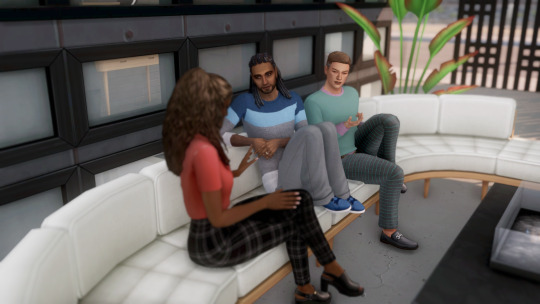
Solomon: I can’t believe Jimmy was out of prison and she didn’t even say anything.
Chantal: Yeah, I’m pretty pissed off about it myself. I’ve been so stressed worrying about Johnny on top of everything else.
David: Is work still giving you trouble?
Chantal: Yeah.
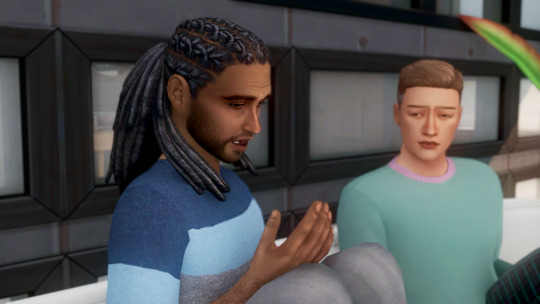
Solomon: Just talk to us about it, honey. You don’t have to go through this alone.
David: Yeah, we’re here for you. That’s how things work in this family.
Chantal: Okay, I think I’m in over my head at this point anyway. So the CEO has gotten herself into some legal trouble. She was purchasing ingredients through third party sellers that don’t meet government standards. The ingredients caused some bad reactions and now people are taking legal action.
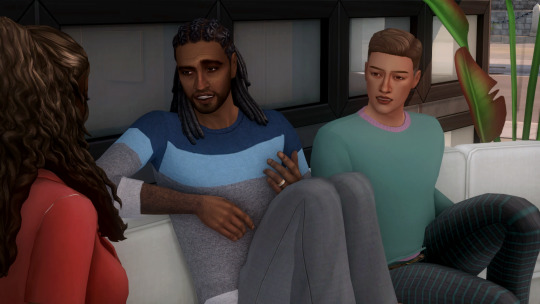
Solomon: Sounds like she’s gotten herself into quite the mess. Are you going to quit?
Chantal: Well, it’s not that simple. I’ve been helping gather evidence against her for the opposition that they couldn't get. They needed my help because I have connections at the company.
David: What kind of connections?
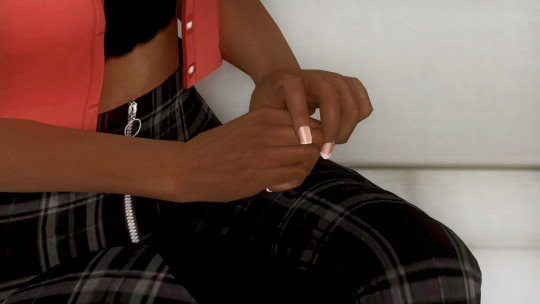
Chantal: I don’t want to say.
Solomon: Chan, you know you can tell us anything. We’re here to help.
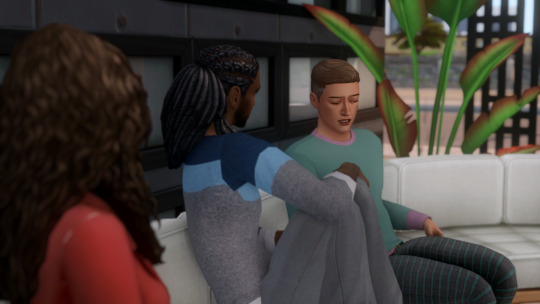
Chantal: I…kind of had a relationship with my boss. But I found out he knows about the ingredients, and he’s just using me.
David: Oh, Chan, I wish you’d told us about all of this.
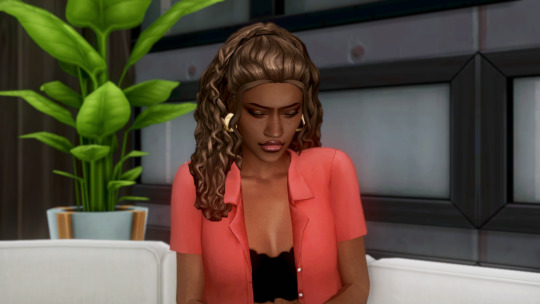
Chantal: I just feel so ashamed. I knew it was wrong, but he just kept telling me all of these good things and I just wanted to feel special.
Solomon: Honey, you are special. You don’t need a man to tell you that.
Chantal: I don’t know what’s wrong with me. I started that job with the intention of working hard and proving myself, and I ended up almost ruining my life for a man.
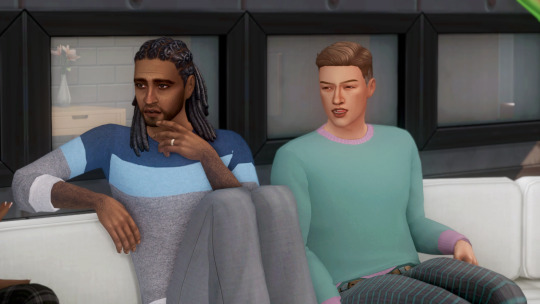
David: No, this isn’t your fault. That man manipulated someone vulnerable for his own benefit.
Solomon: People like that know how to seek out people’s insecurities and use them against them.
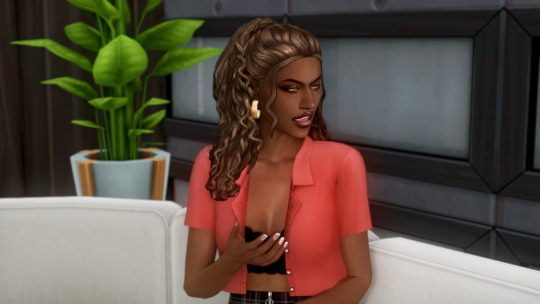
Chantal: I guess I didn’t realize I was so insecure. I’ve always thought I was strong and self-assured. I just don’t know how I got myself into this position.
David: You don’t have to be strong all of the time.
Chantal: I know. I just hate feeling like I don’t have it together. I don’t want to have to rely on other people.

Solomon: That’s what we’re here for, to give you a safe place to come to when you need help.
David: We’re really proud of you for opening up about this. I know it’s hard to ask for help, but everyone needs other people sometimes. Is there anything we can do?
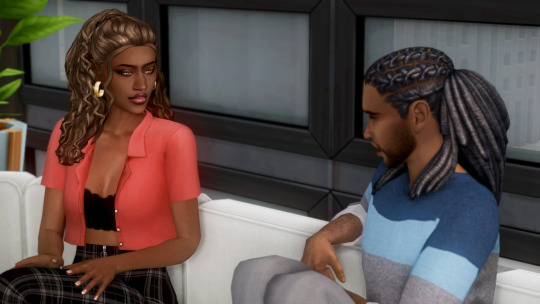
Chantal: Could you guys come with me to talk to the prosecutor? I’m supposed to be a witness for the prosecution, but my bosses think I’m going to help them out. I’m worried about what they’ll do when they realize what I’m doing.
Solomon: Of course, honey. We’ll be there when you speak with the lawyer and we’ll come to the trial. What’s the lawyer’s name?
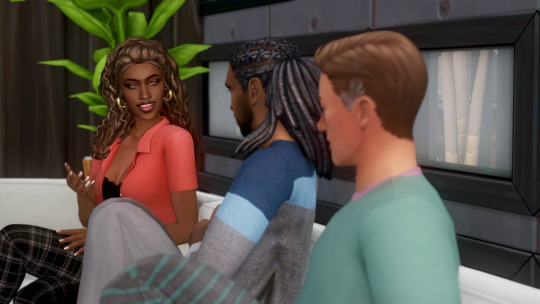
Chantal: It’s Lou DiMarco. From what I could find online, he seems like a decent guy.

Previous | Beginning of story | Beginning of chapter | Next
#ts4#sims 4#the sims 4#ts4 story#simblr#sims storytelling#sims story#simlit#stksafeharbor#safeharborstory#sh:chapter2#sh:chantal#sh:david#sh:solomon
35 notes
·
View notes